Why you can trust Tom's Hardware
Desktop PC Application Benchmarks on Ryzen 9 7950X and Ryzen 5 7600X — The TLDR:
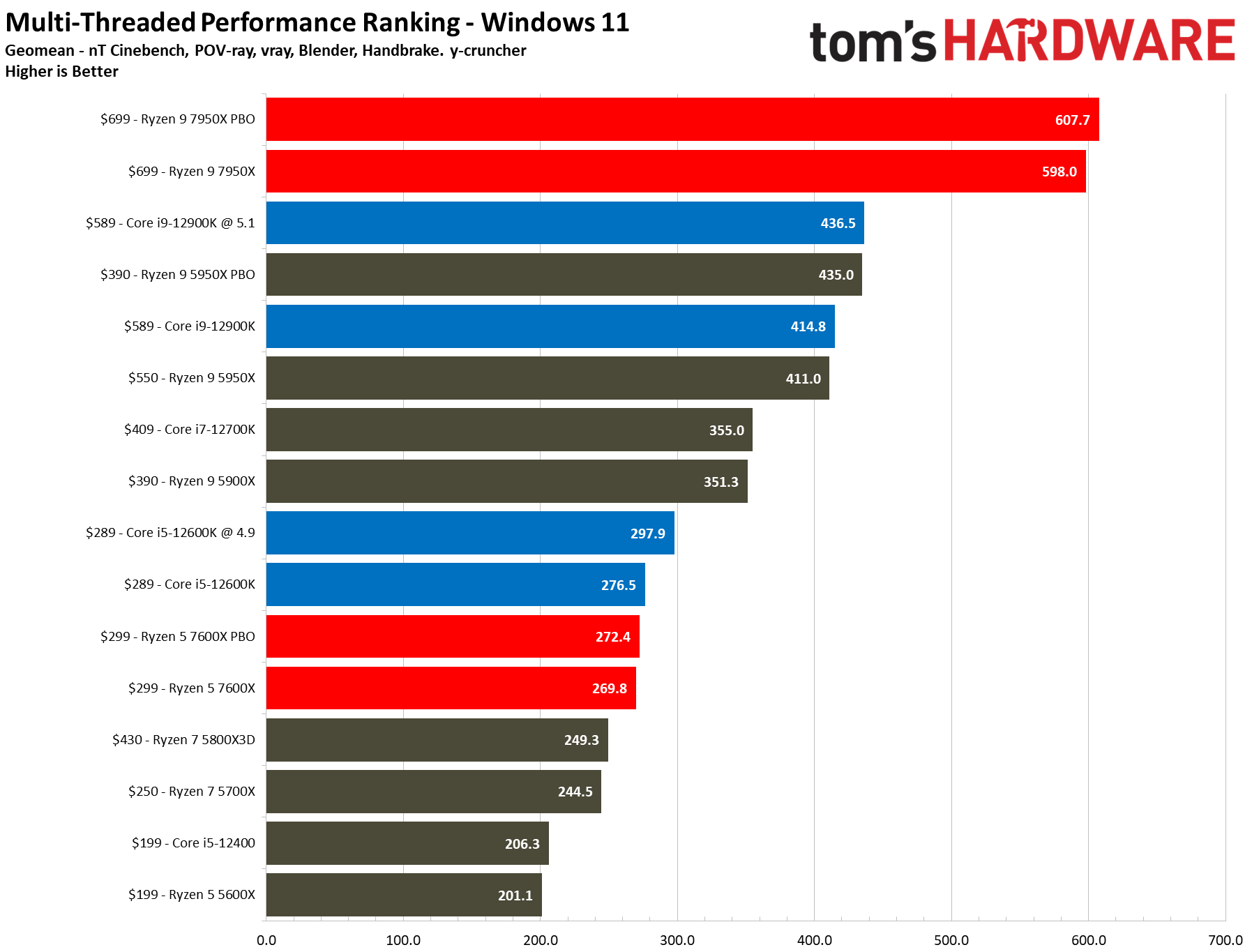
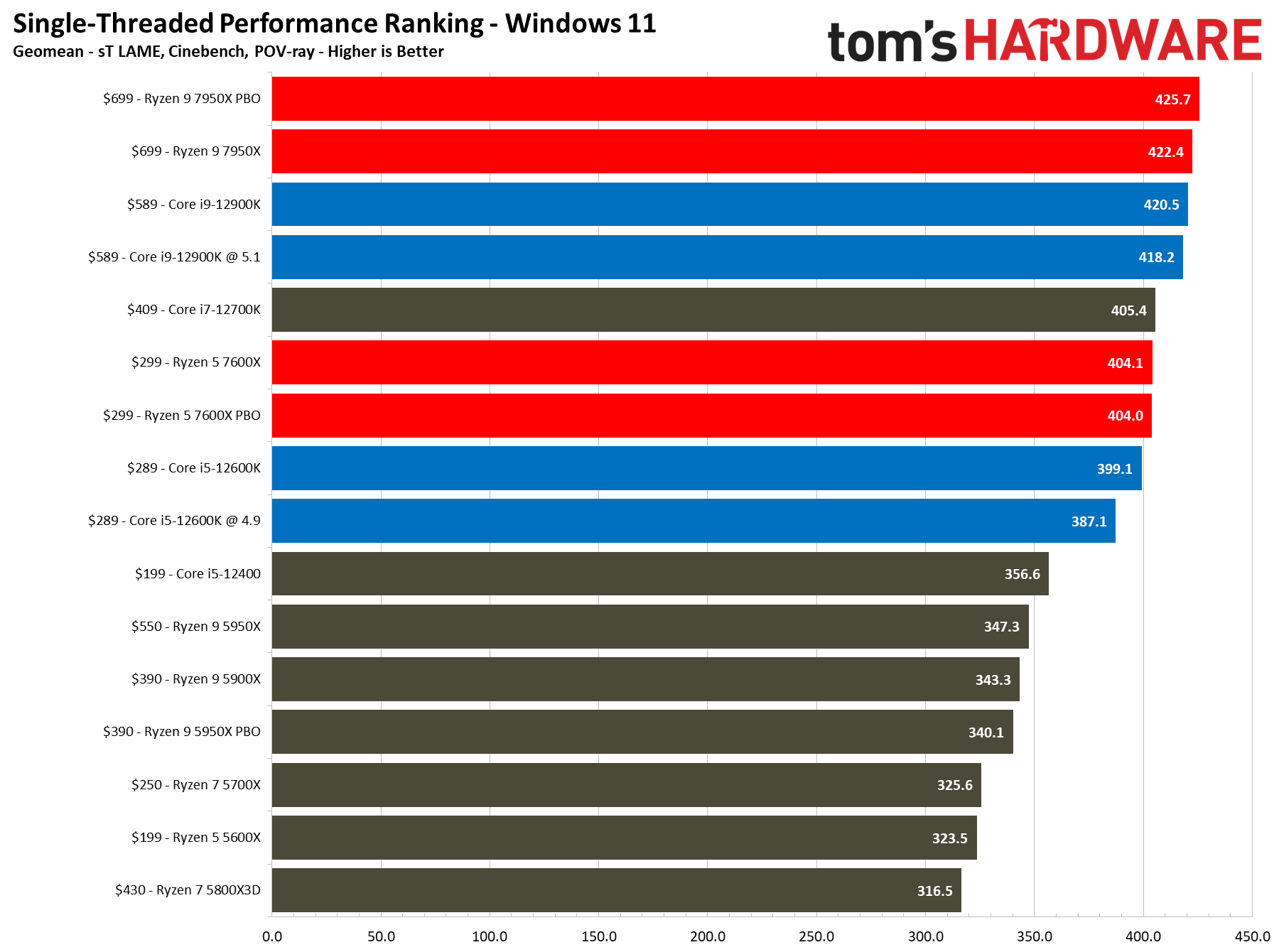
It should come as no surprise that the Ryzen 9 7950X absolutely dominates our cumulative measurement of multi-threaded performance, but the delta is impressive nonetheless. The 7950X is a whopping 44% faster than the Core i9-12900K, and overclocking does little to close the gulf between the chips. The 7950X is also 45% faster than the 5950X, living up to AMD’s performance claims.
For perspective, the beastly $3,299 Threadripper Pro 32-core Ryzen 9 5975WX is only 17% faster than the 7950X in this same cumulative measurement. However, it costs 5 times more, highlighting just how exceptional this amount of threaded horsepower is on a mainstream PC platform. This probably has something to do with AMD’s decision not to bring a Zen 3-powered HEDT platform to market.
That’s a tough act for the 7600X to follow, especially given that the Core i5-12600K is a few percentage points faster in threaded work. That comes on the strength of the 12600K’s e-cores, and overclocking extends the 12600K’s lead to 10%. In either case, the Ryzen 5 7600X still marks a solid generational improvement for Ryzen, as it is 34% faster than the prior-gen Ryzen 5 5600X.
Intel’s Alder Lake took a pronounced lead in single-threaded performance over the prior-gen Ryzen 5000 processors, but the Zen 4 architecture takes a big step forward, slightly edging out the price-comparable Alder Lake chips. In our cumulative measurement of single-threaded performance, the Ryzen 9 7950X and 7600X effectively tie the Core i9-12900K and 12600K, respectively, leveling the playing field.
You’ll notice that the overclocked configurations offer little to no benefit for the Ryzen processors, as expected, while both Intel processors actually lose some performance in this metric. It isn’t surprising to see the 12900K lose a tad — the all-core 5.1 GHz overclock is lower than its peak 5.2 GHz boosts on a single core — but the 12600K’s decline is a bit unexpected because the overclock matches its peak clock rate. After quite a bit of analysis and repeated testing, it appears that thread targeting isn’t working as effectively with the overclocked Intel configurations, resulting in quite a bit of thread migration during single-threaded tasks. We’re still troubleshooting this issue, but the results are repeatable so we’re including them.
| Tom's Hardware | Multi-Thread | Single-Thread |
| $699 — Ryzen 9 7950X | 100% | 100% |
| $549 — Ryzen 9 7900X | 79.3% | 98.7% |
| $589 — Core i9-12900K | 69.4% | 99.6% |
| $409 — Core i7-12700K | 59.4% | 96% |
| $399 — Ryzen 7 7700X | 57.2% | 97.6% |
| $299 — Ryzen 5 7600X | 45.1% | 95.7% |
| $430 — Ryzen 7 5800X3D | 41.7% | 74.9% |
| $285 — Core i5-12600K | 46.2% | 94.5% |
Rendering Benchmarks on AMD Ryzen 9 7950X and Ryzen 5 7600X
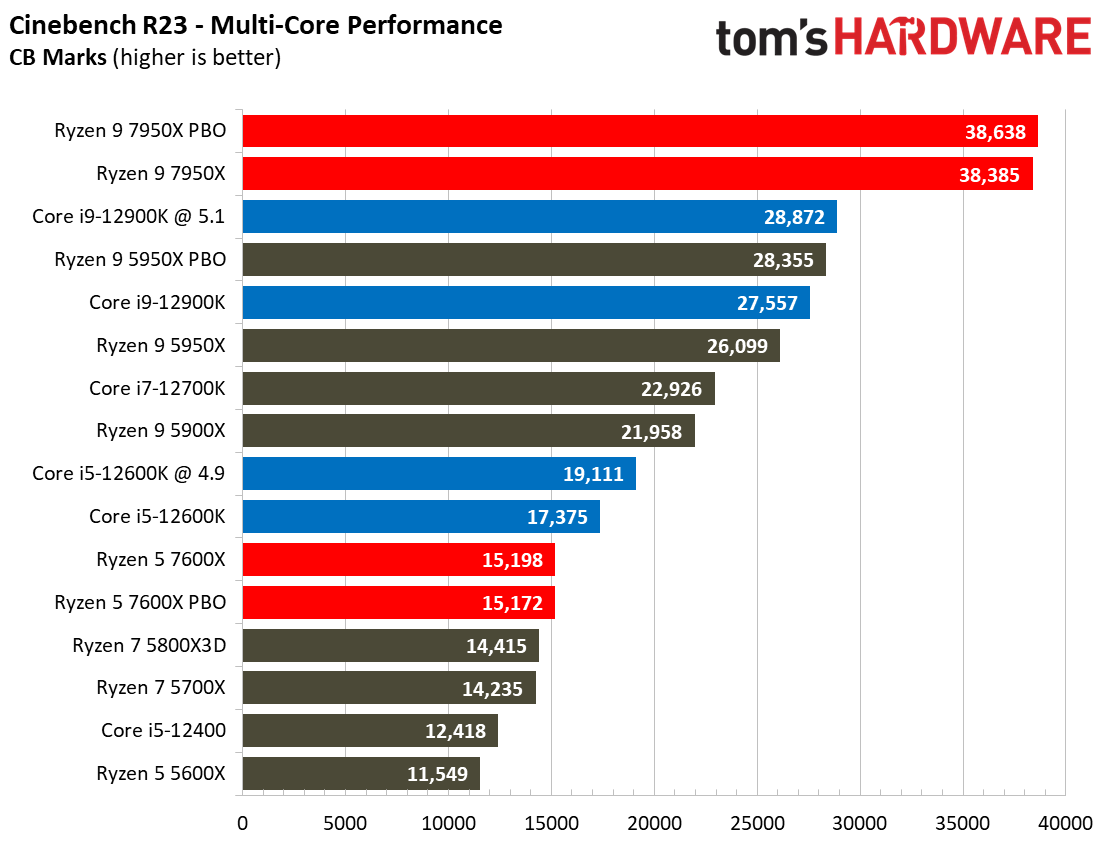
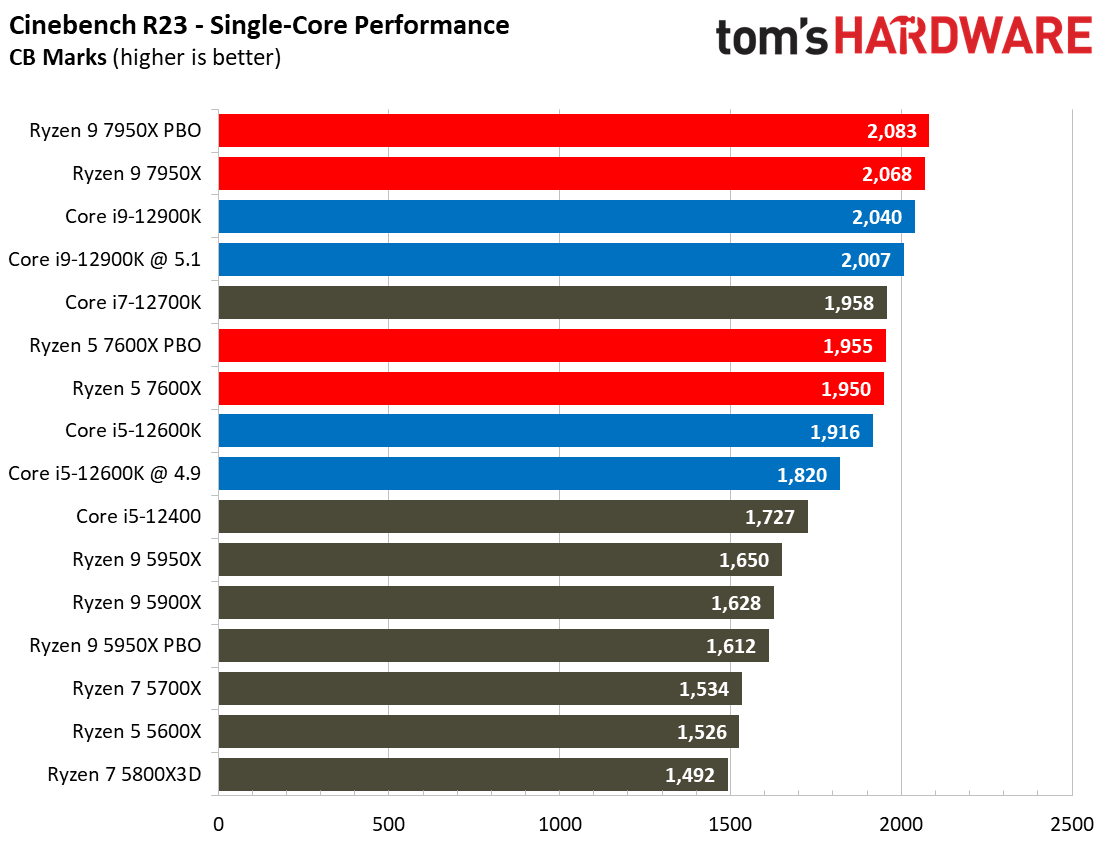
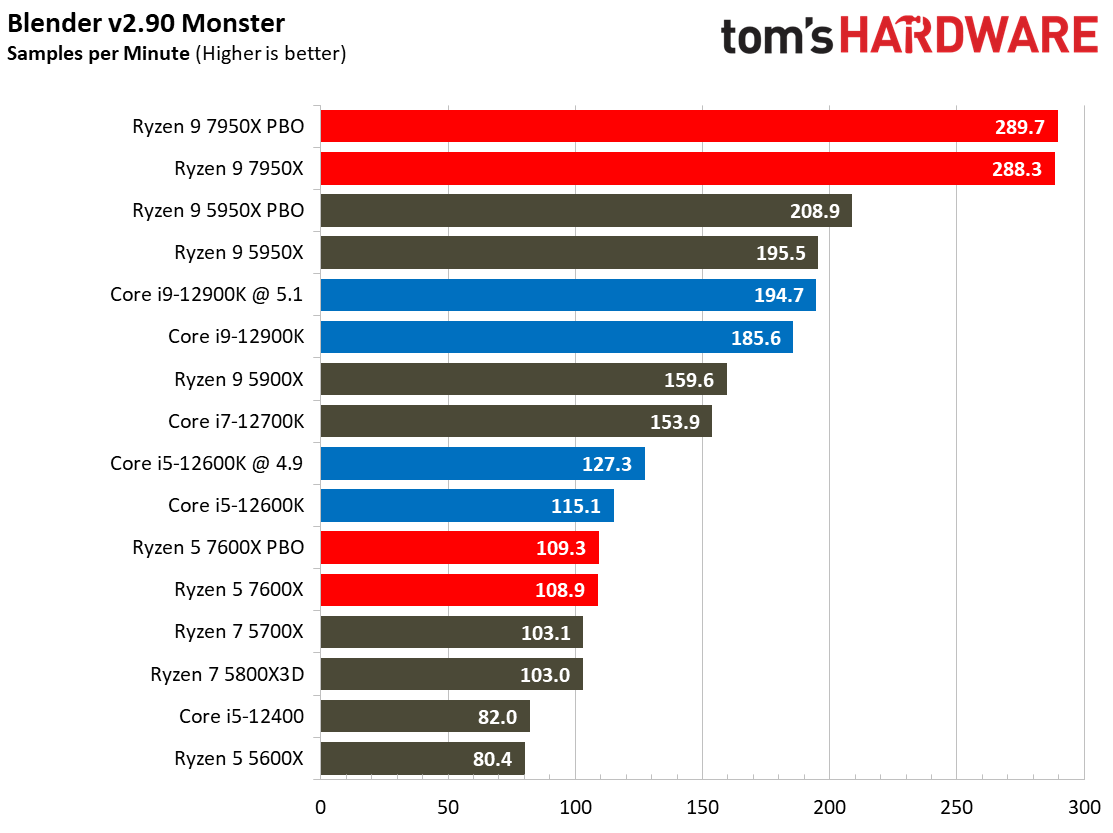
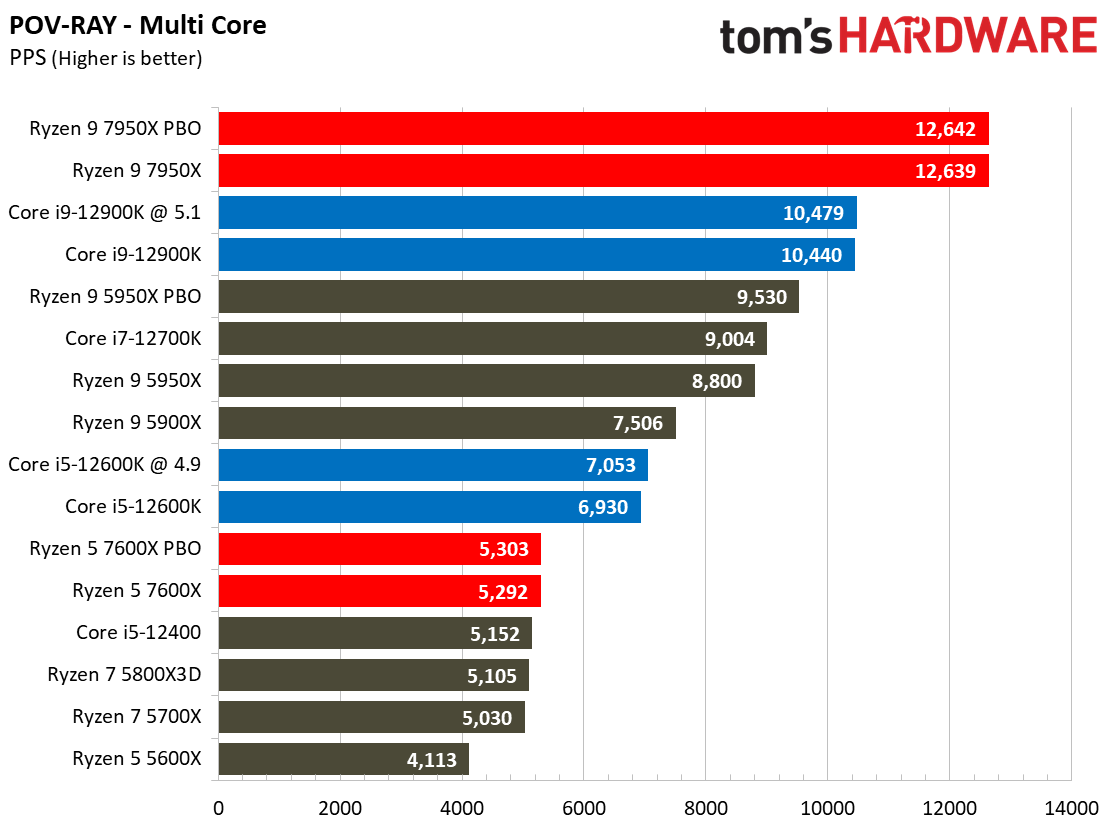
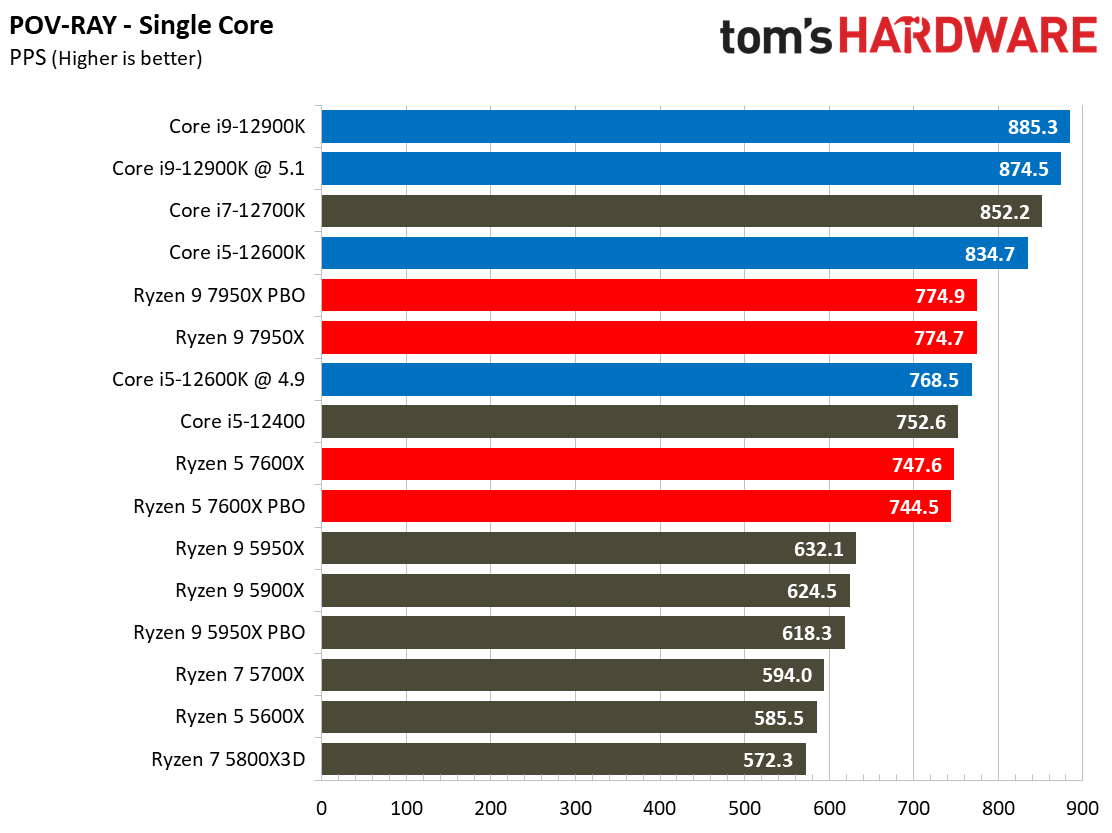
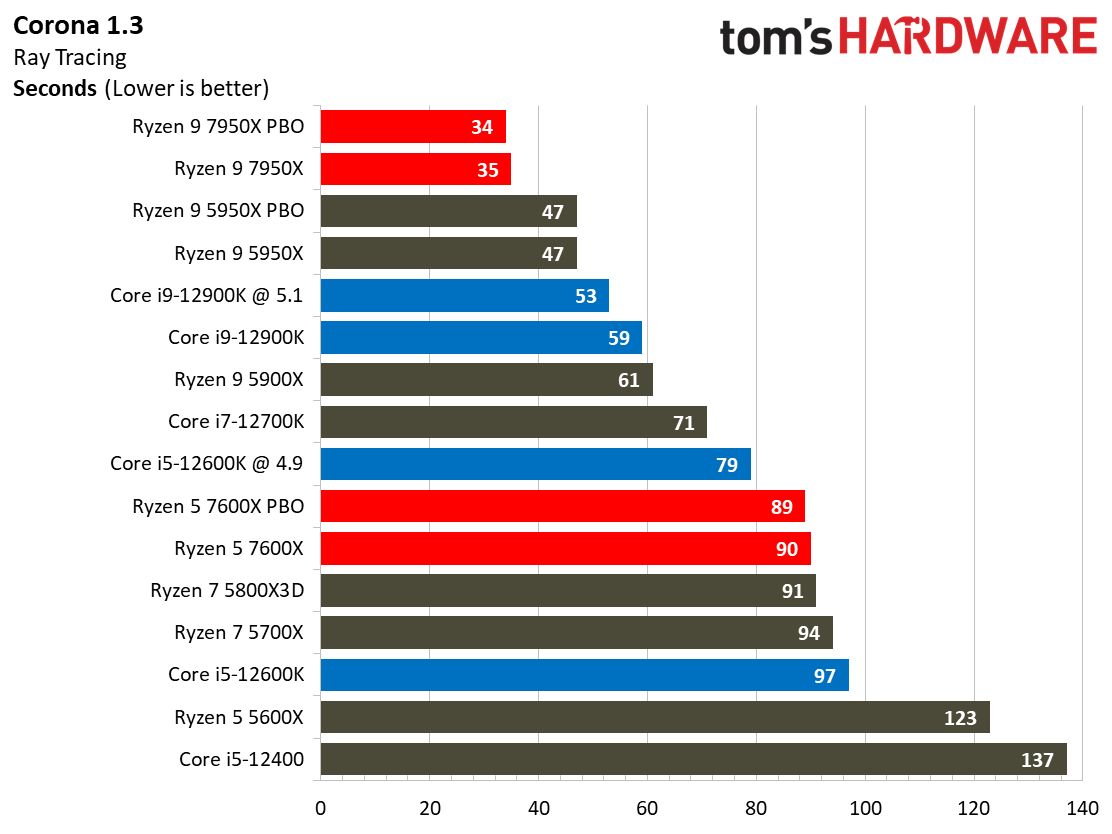
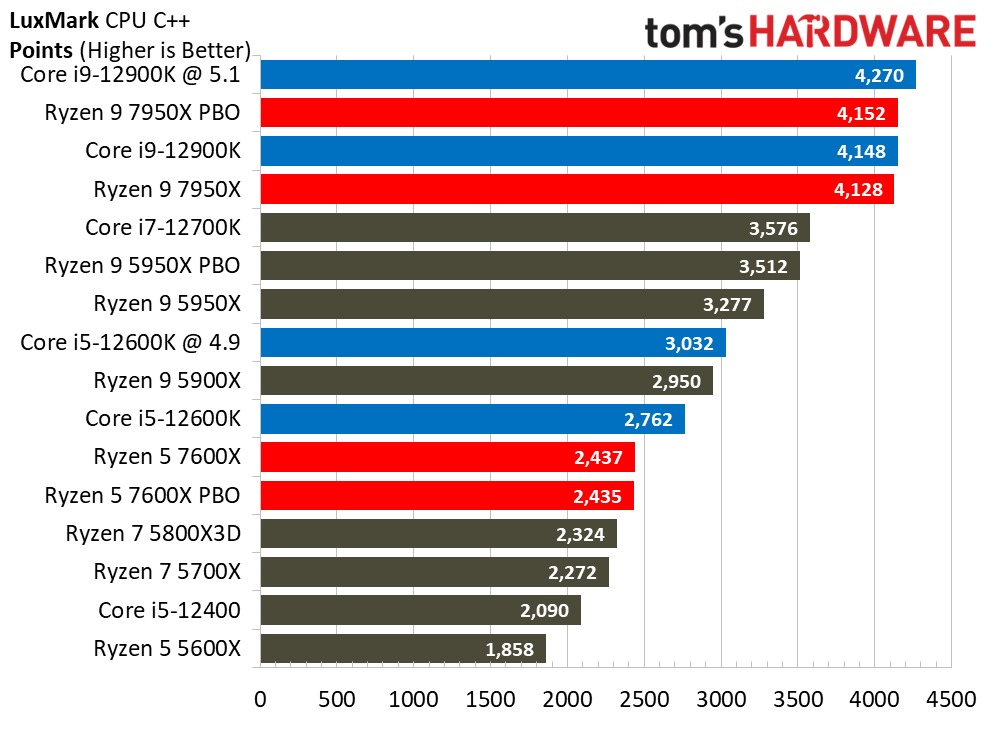
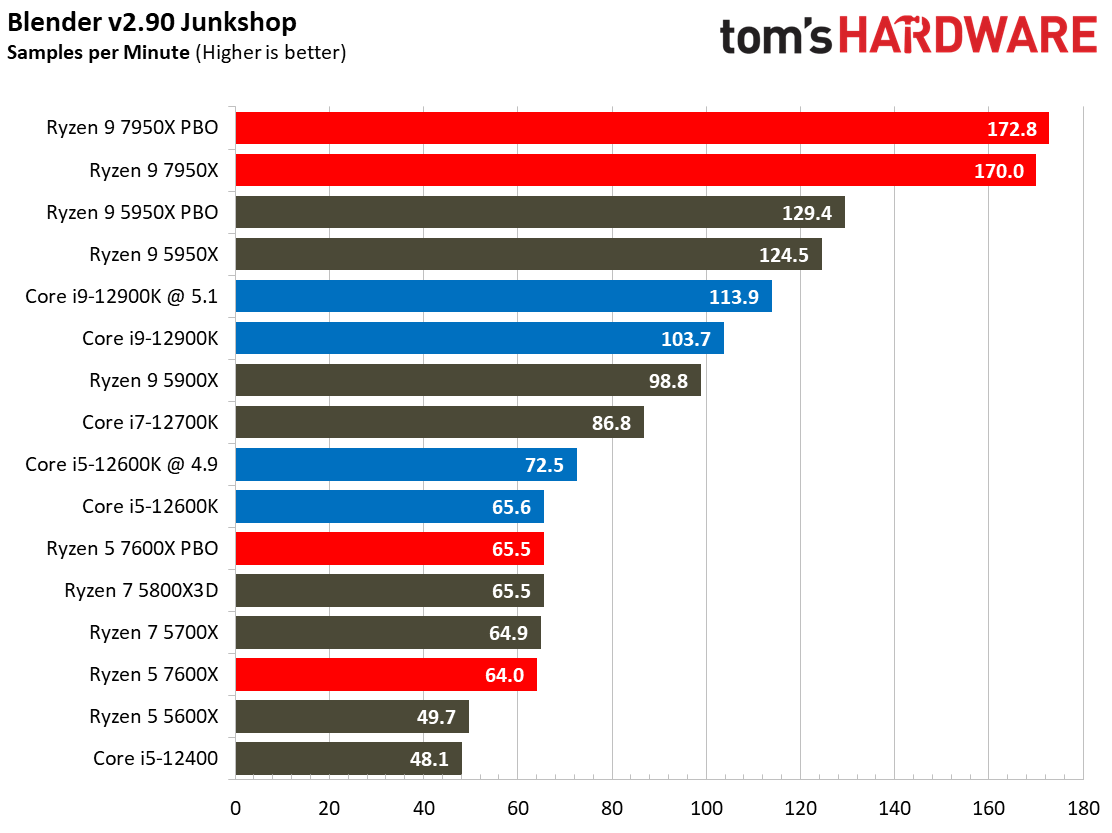
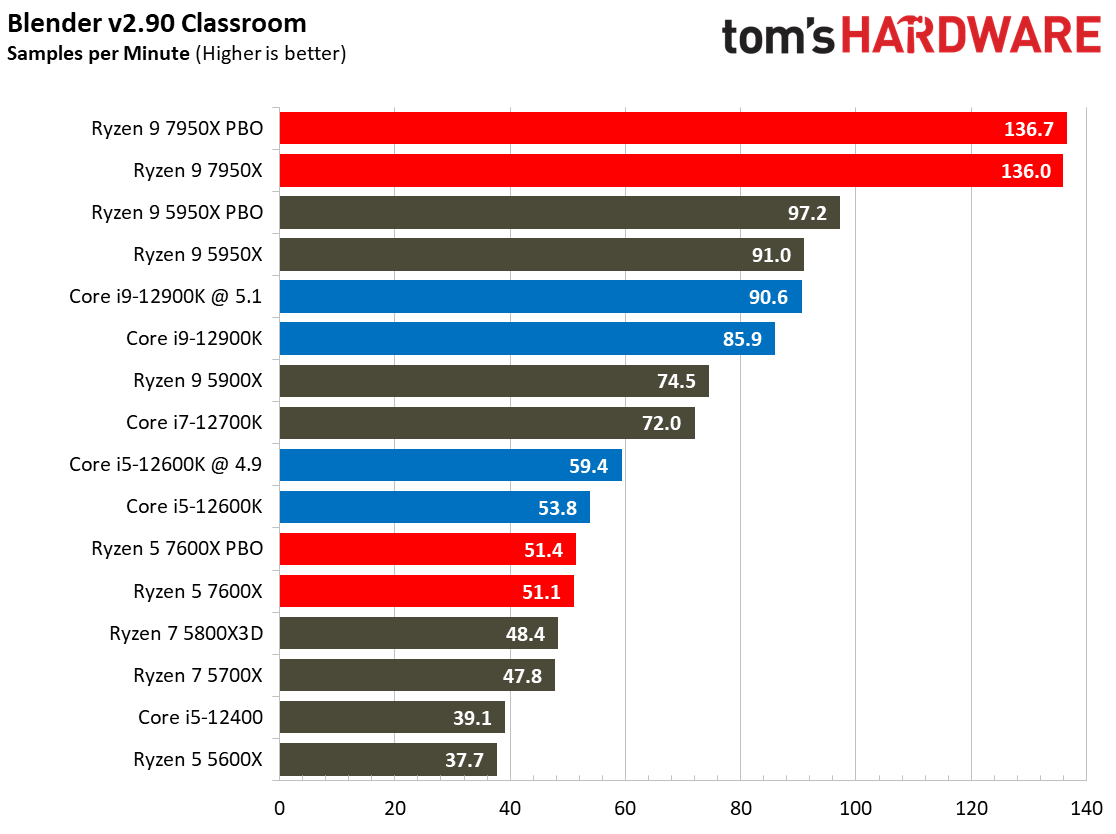
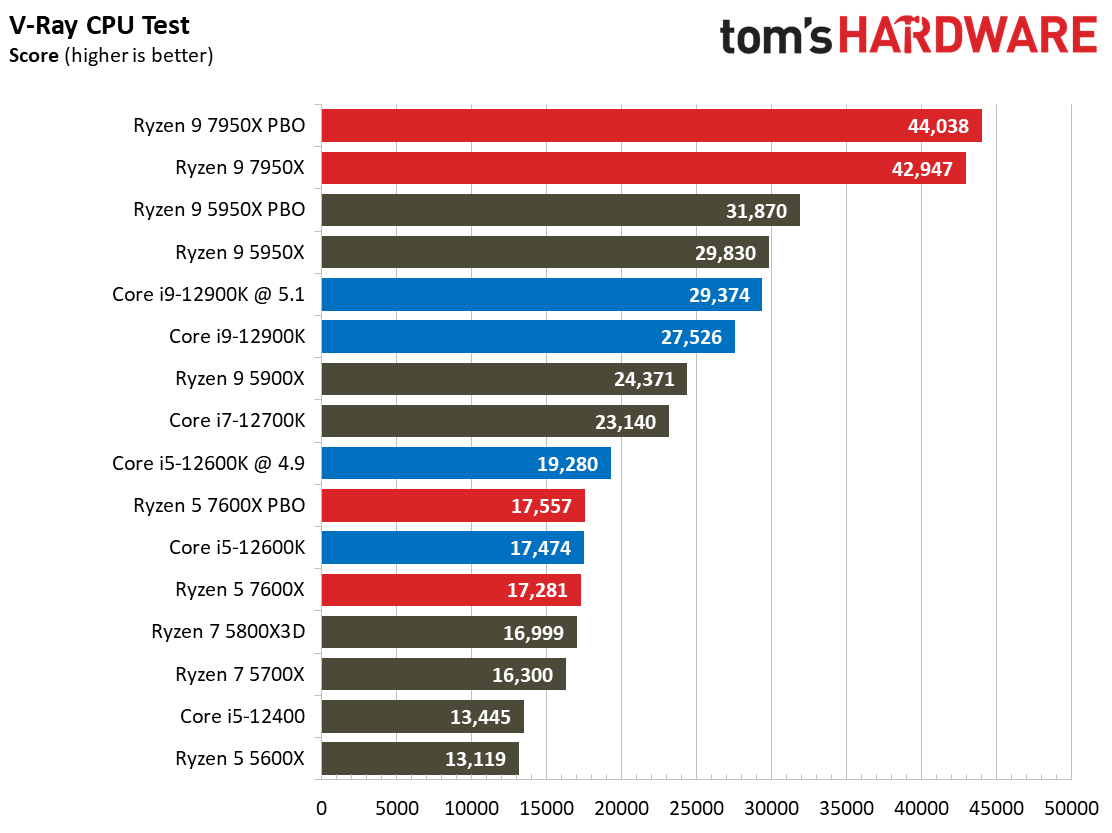
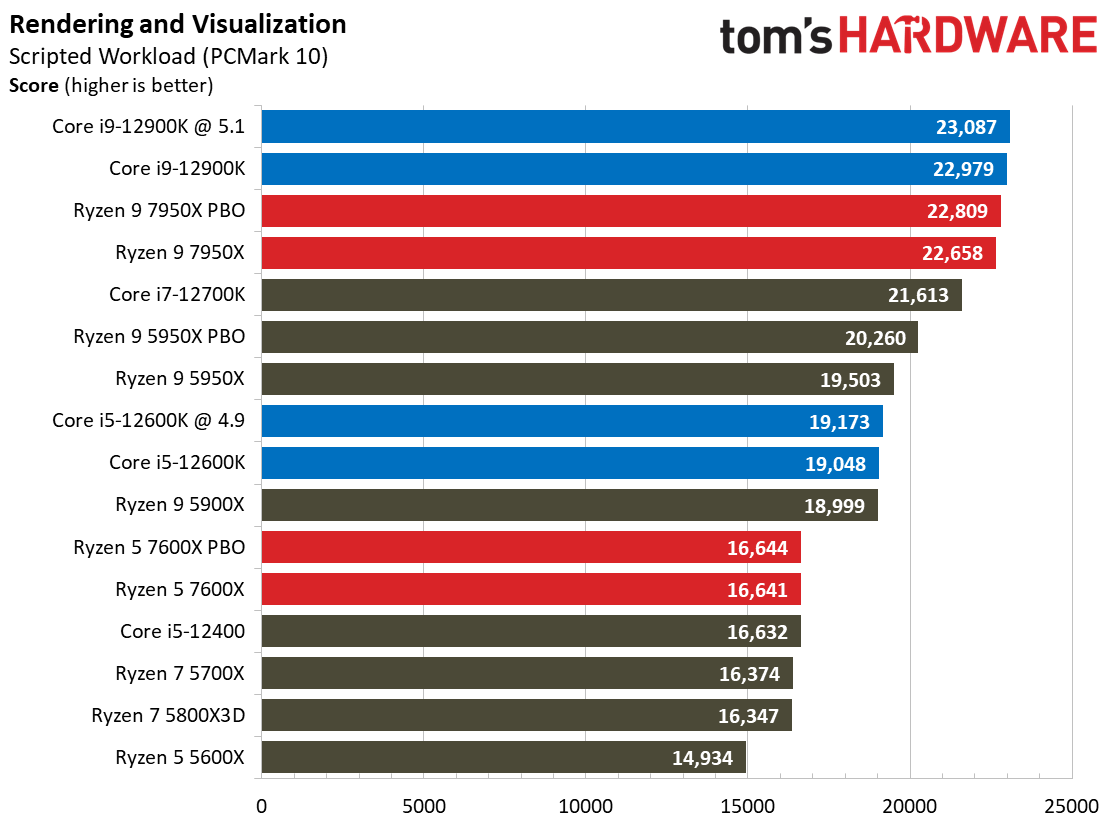
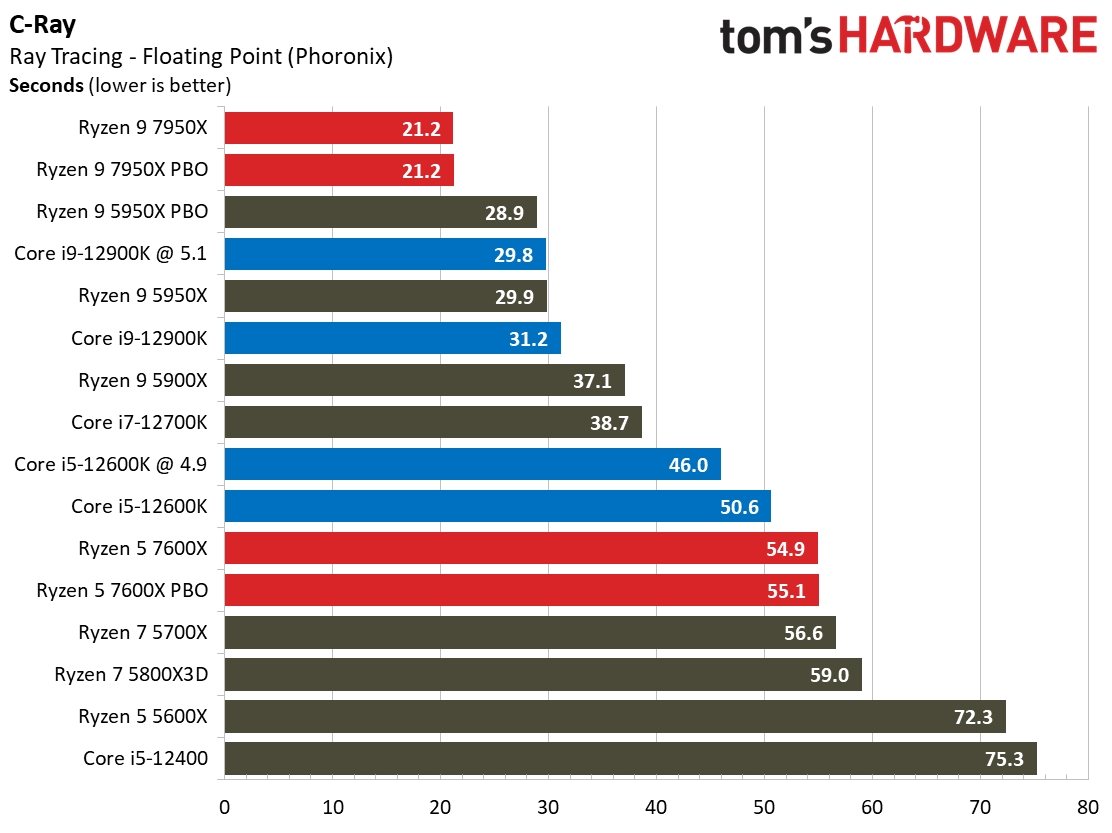
It was initially surprising to see Alder Lake’s hybrid architecture largely beat Ryzen in threaded workloads after AMD had dominated these types of benchmarks for years, but the Ryzen 9 7950X quashes that uprising — at least until Raptor Lake arrives.
For instance, the 7950X is 40% and 21% faster than the 12900K in the multi-threaded Cinebench and POV-Ray benchmarks, showing that Ryzen 9’s advantage isn’t small. We see an even bigger difference in the Blender renders, where the 7950X is from 55% to 63% faster than the 12900K, and overclocking the Intel chip isn’t enough to change the picture.
Get Tom's Hardware's best news and in-depth reviews, straight to your inbox.
The 12900K fares better in single-threaded Cinebench but it still trails the 7950X slightly. The Zen 4 architecture shows great gains over the Zen 3 chips in the single-threaded POV-Ray benchmark, but Alder Lake maintains the lead — the 12900K is 14% faster than the 7950X.
Turning to the Core i5-12600K vs Ryzen 5 7600X battle, we see that Core i5 either matches or exceeds the 7600X in nearly every rendering benchmark, be it single- or multi-threaded. Aside from the LuxMark and POV-Ray benchmarks, most of the deltas between the two chips in threaded workloads aren’t overly large.
Encoding Benchmarks on AMD Ryzen 9 7950X and Ryzen 5 7600X
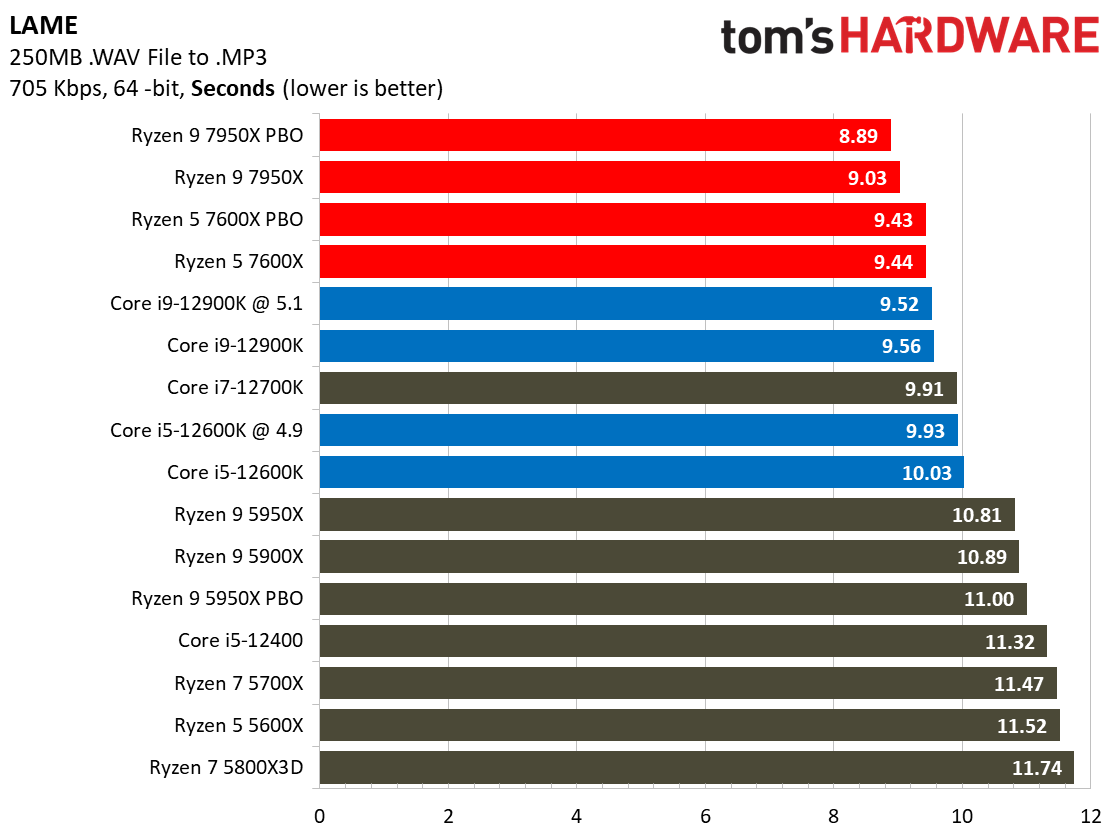
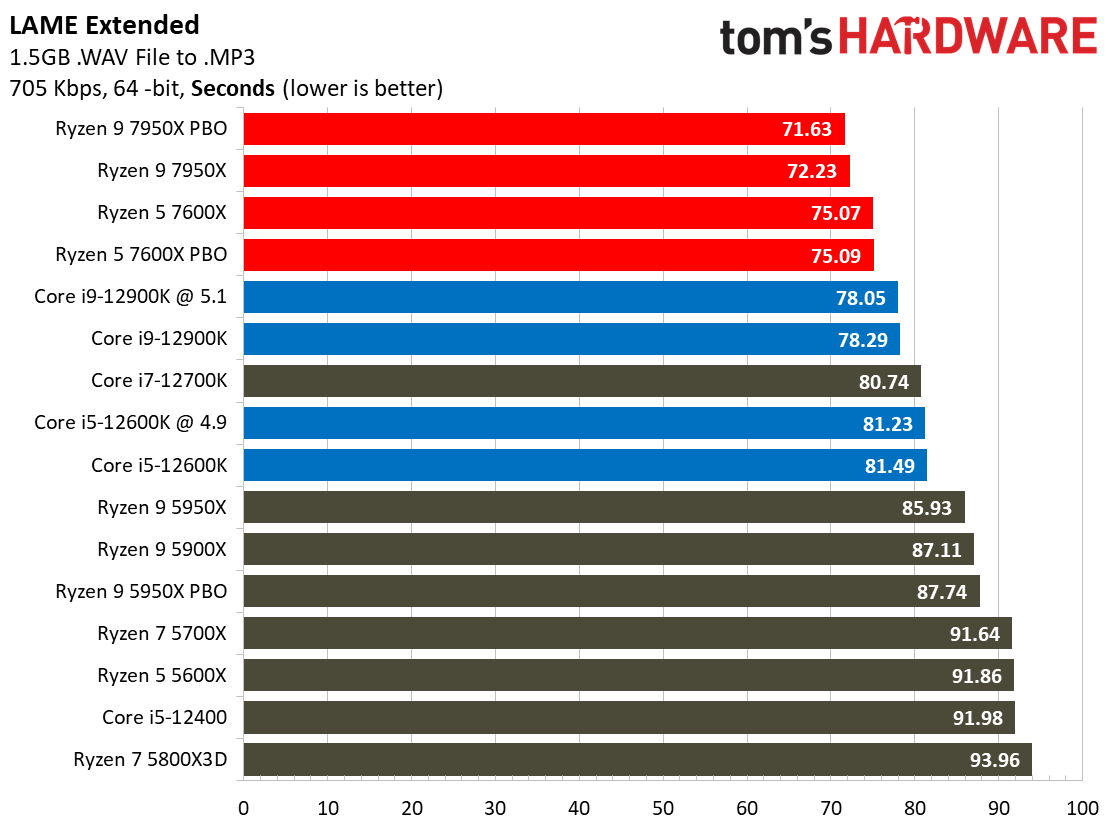
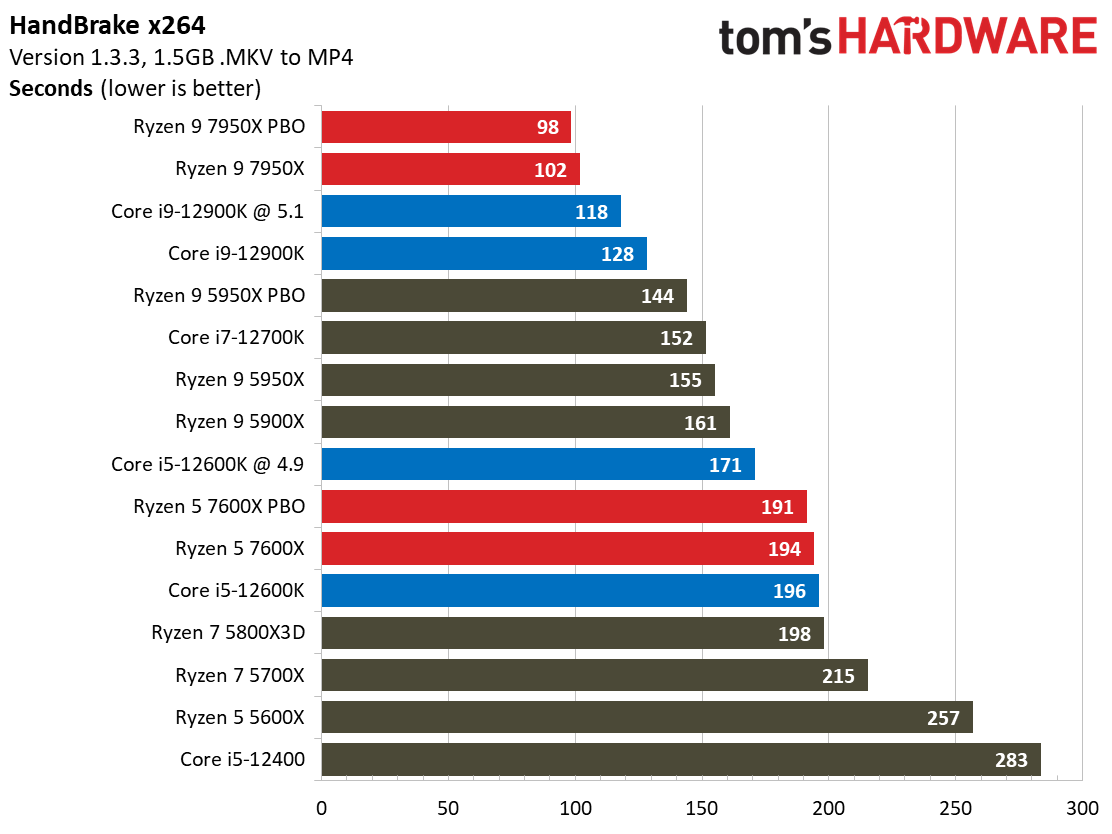
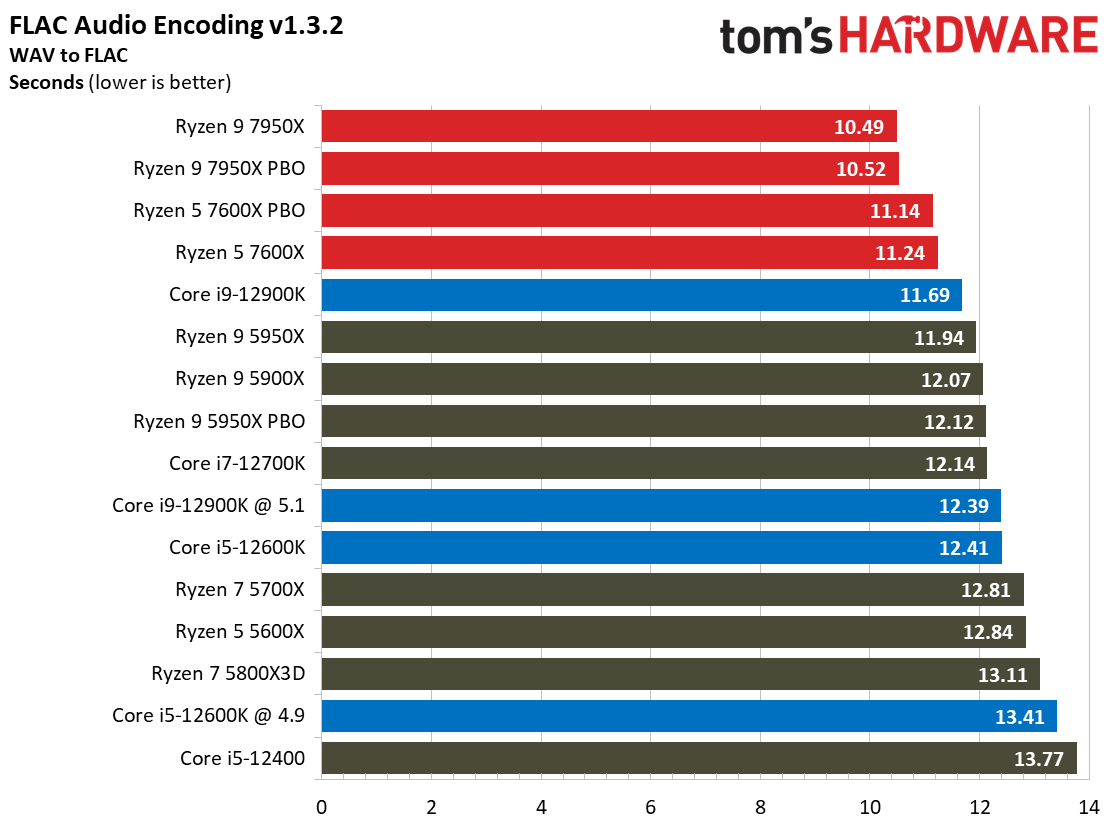
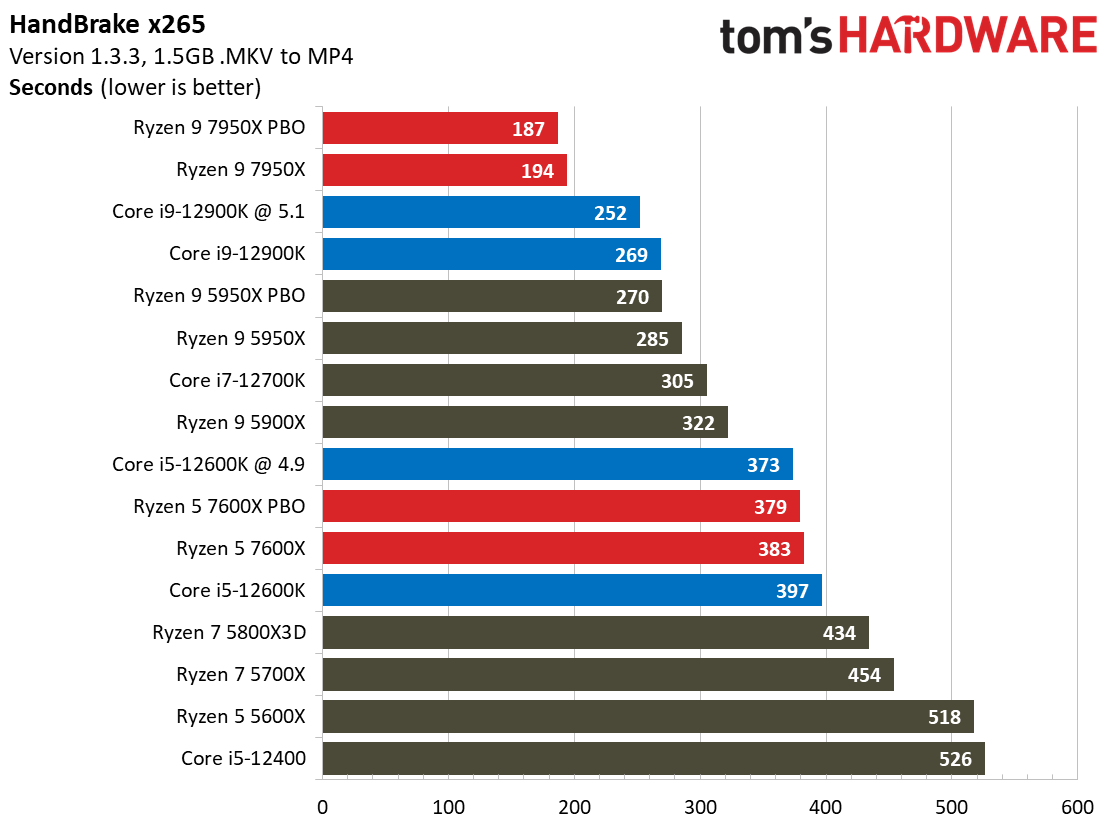
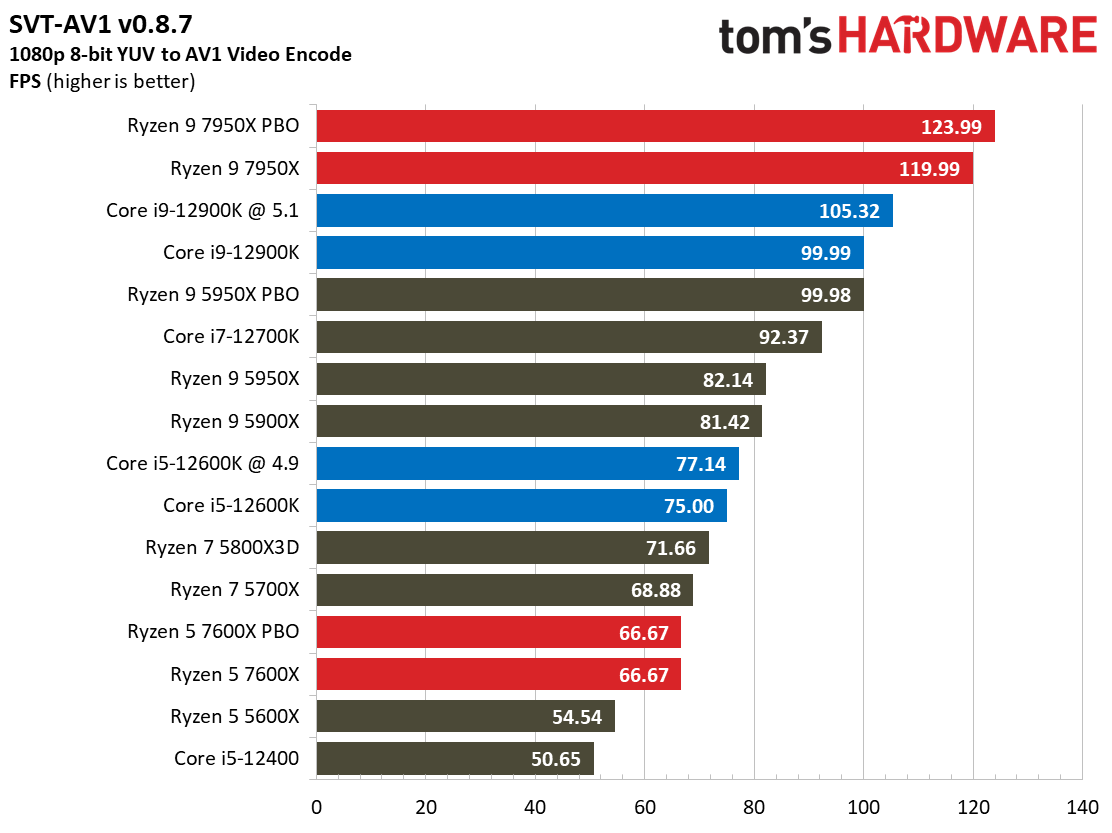
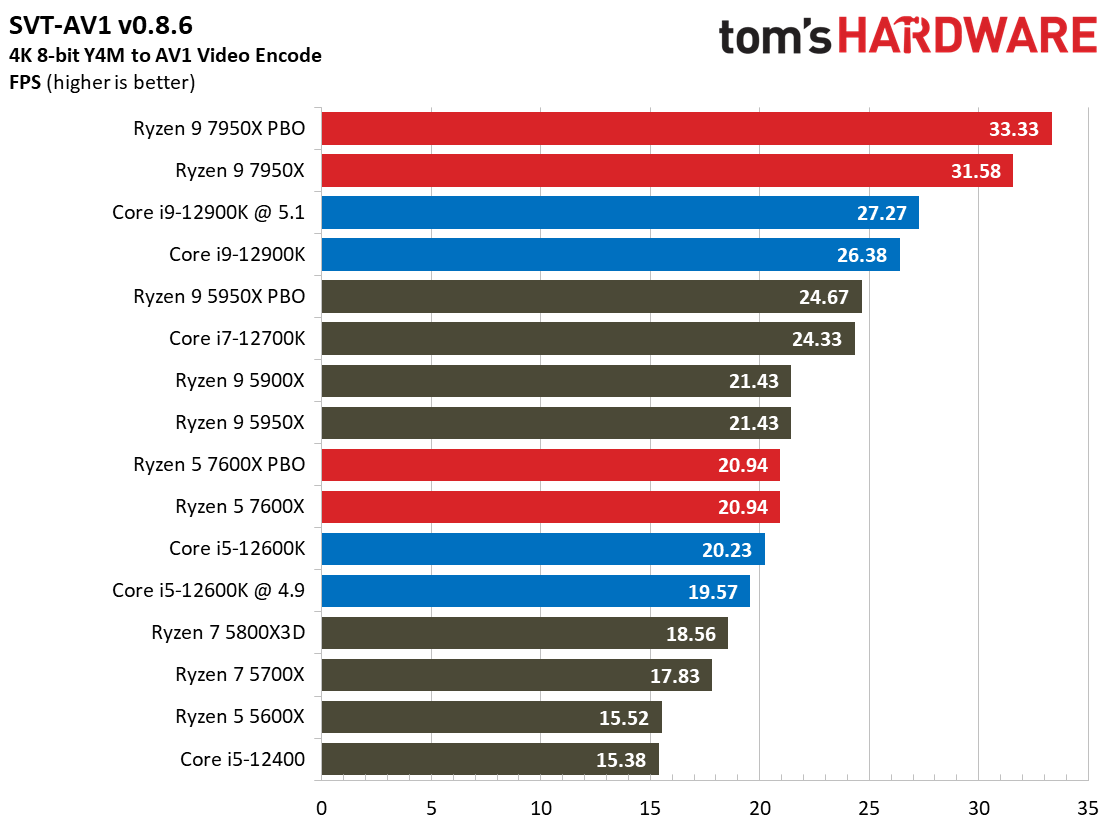
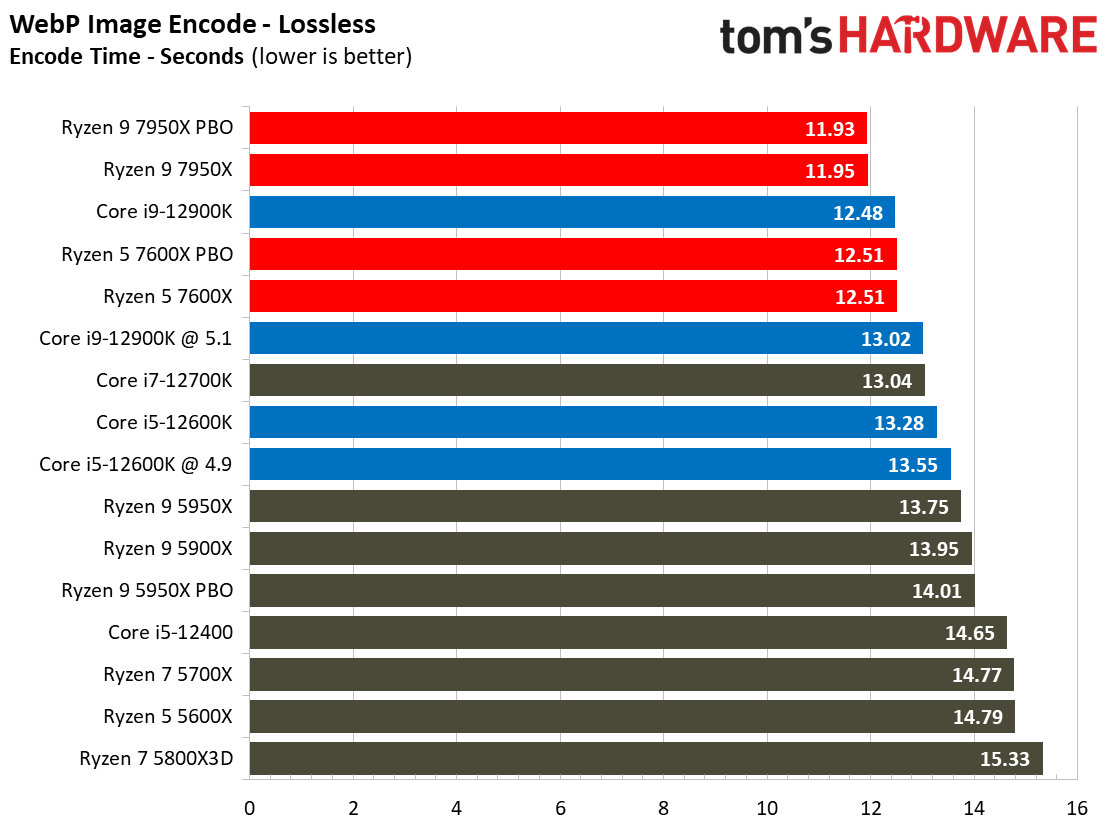
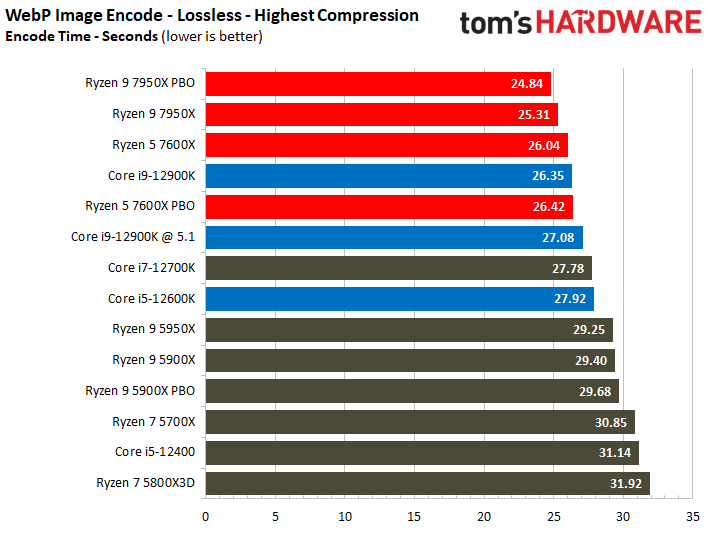
Most encoders tend to be either heavily threaded or almost exclusively single-threaded, but Ryzen 7000 takes the lead in both types of applications.
The Ryzen 9 7950X and Ryzen 5 7600X take meaningful leads in the single-threaded LAME, WebP, and FLAC encoders. The 7950X also dominates the threaded HandBrake and SVT-AV1 benchmarks, but here we see the 7600X and the 12600K again locked in a tight battle that can go either way depending upon the benchmark.
Adobe Premiere Pro, Photoshop and Lightroom on AMD Ryzen 9 7950X and Ryzen 5 7600X
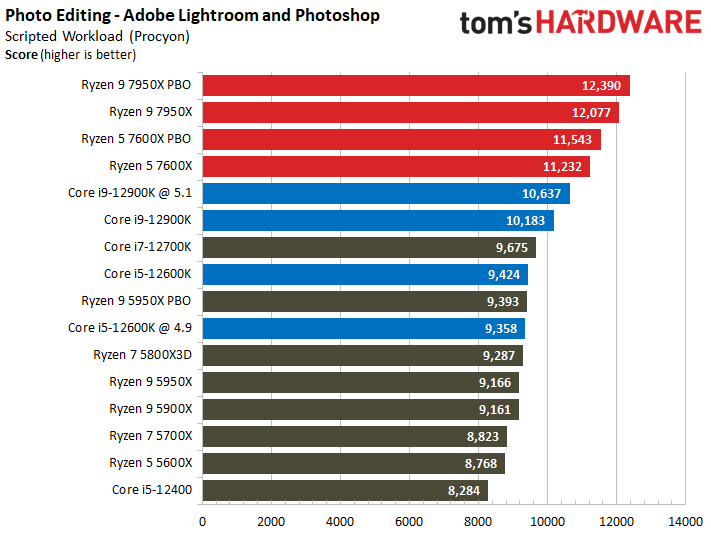
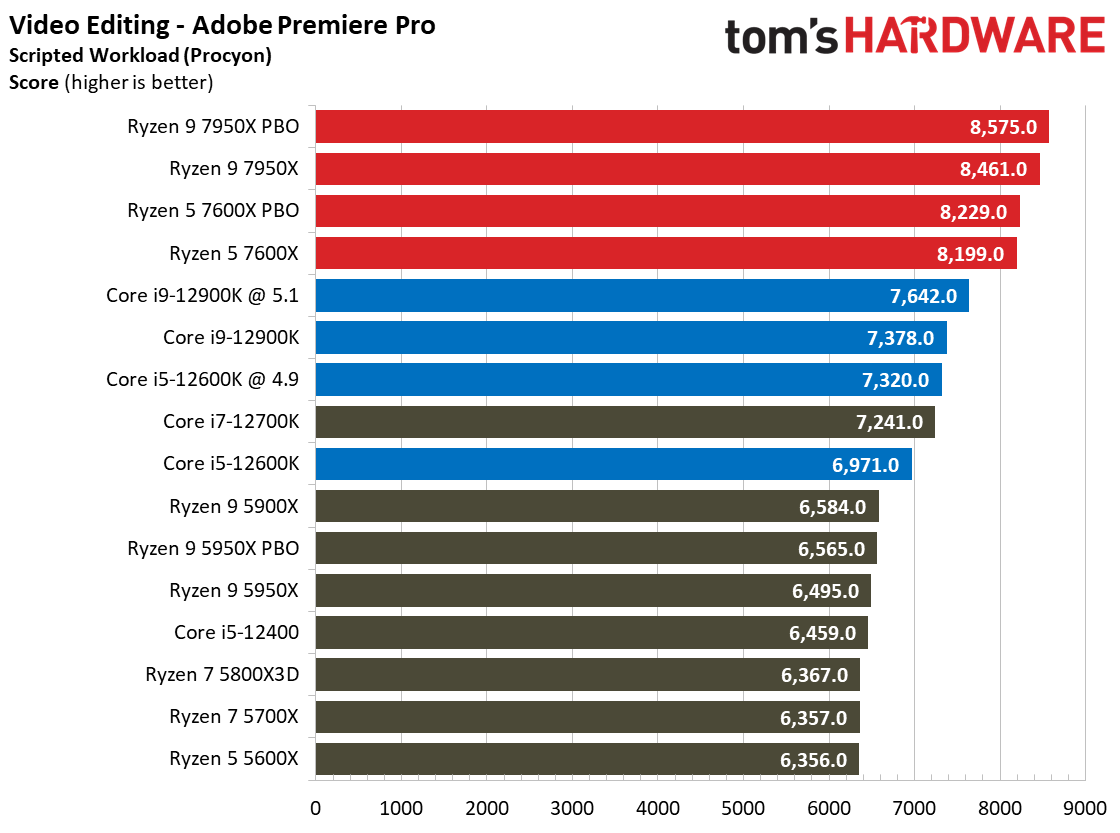
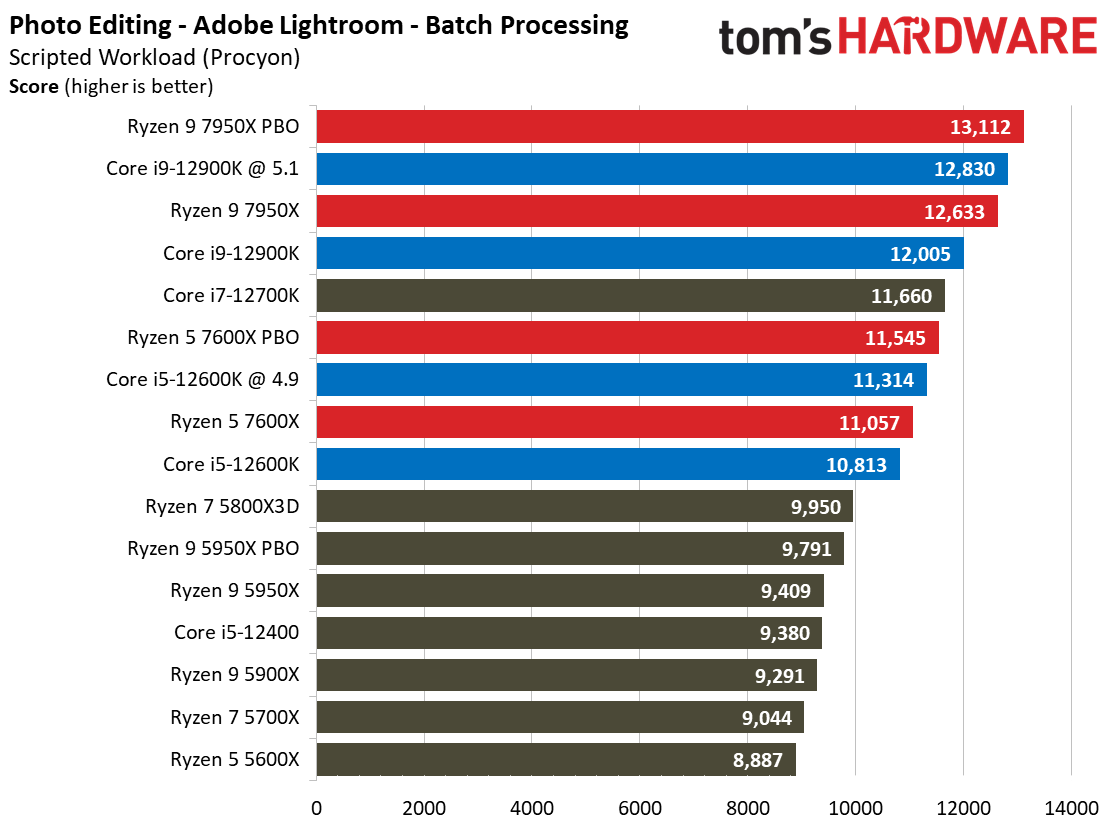
We've integrated the UL Benchmarks Procyon tests into our suite to replace the aging PCMark 10. This new benchmark runs complex Adobe Premiere Pro, Photoshop, and Lightroom workflows with the actual software, making for a great real-world test suite.
The Ryzen 7000 chips beat Alder Lake handily in Premiere Pro and the entire Lightroom and Photoshop benchmark, though the Ryzen 5 and Core i5 chips are more closely matched in the Lightroom batch processing sub-test.
Web Browsing, Office and Productivity on AMD Ryzen 9 7950X and Ryzen 5 7600X
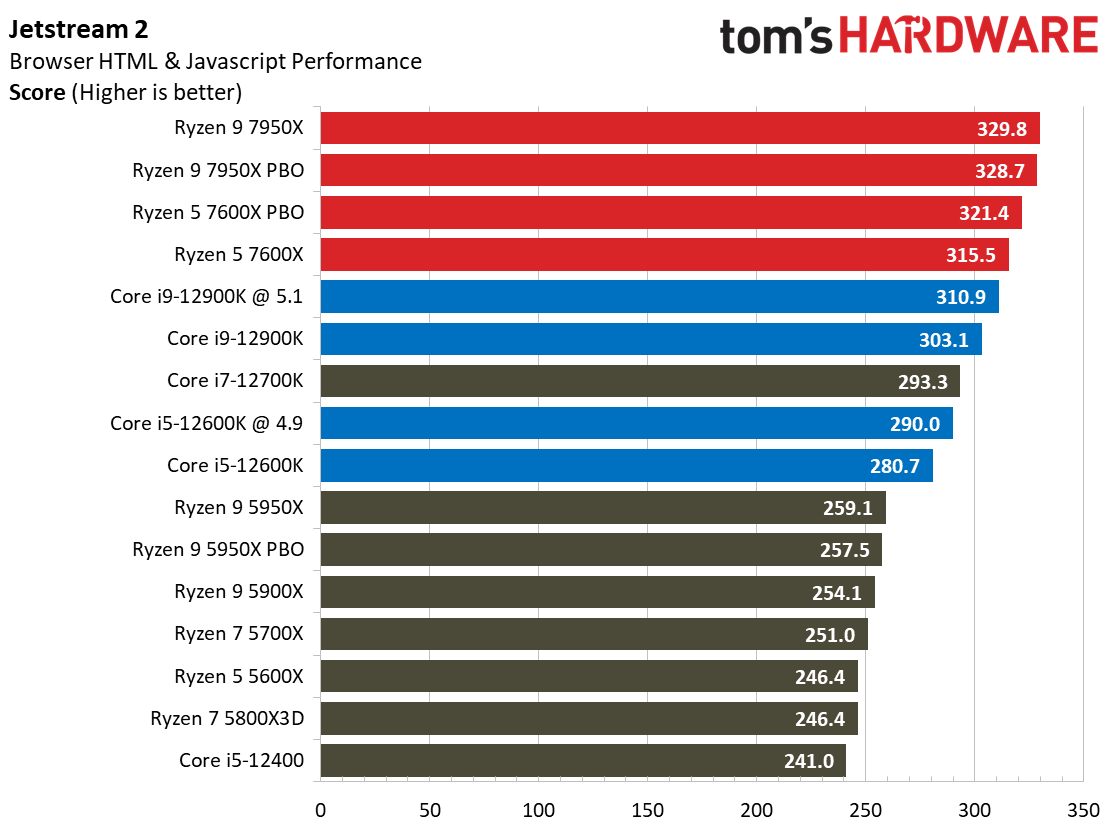
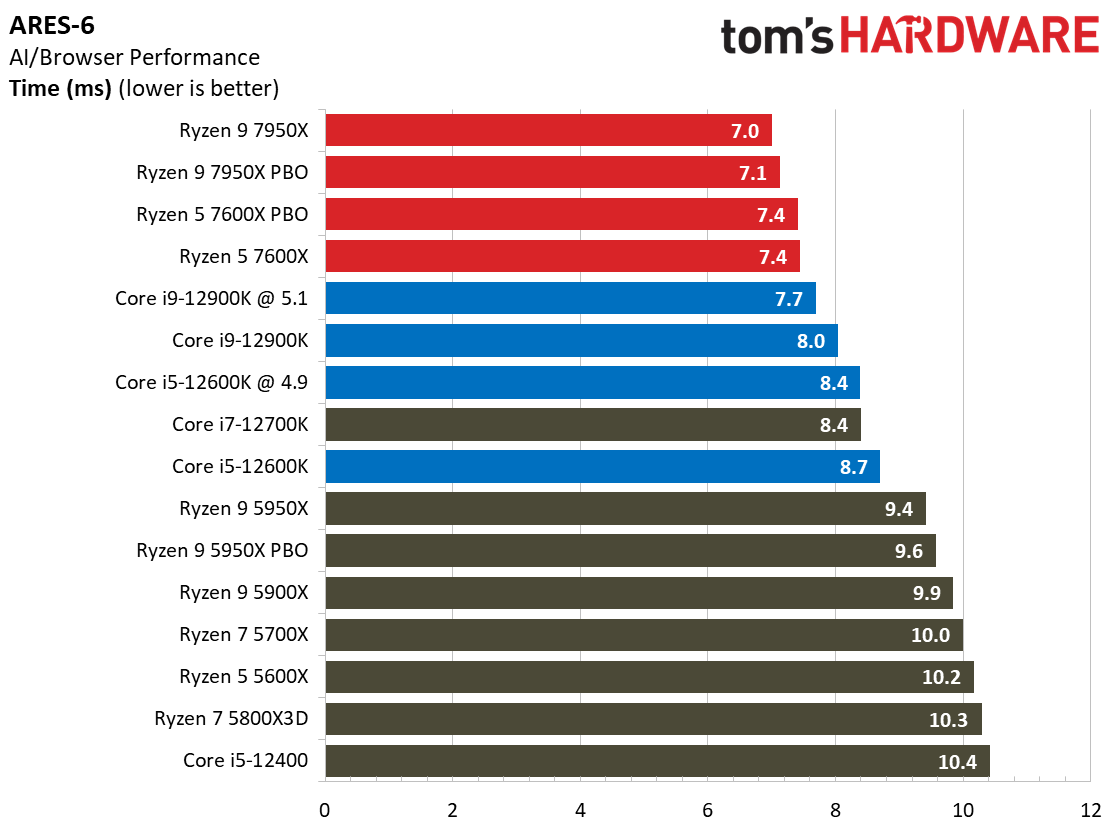
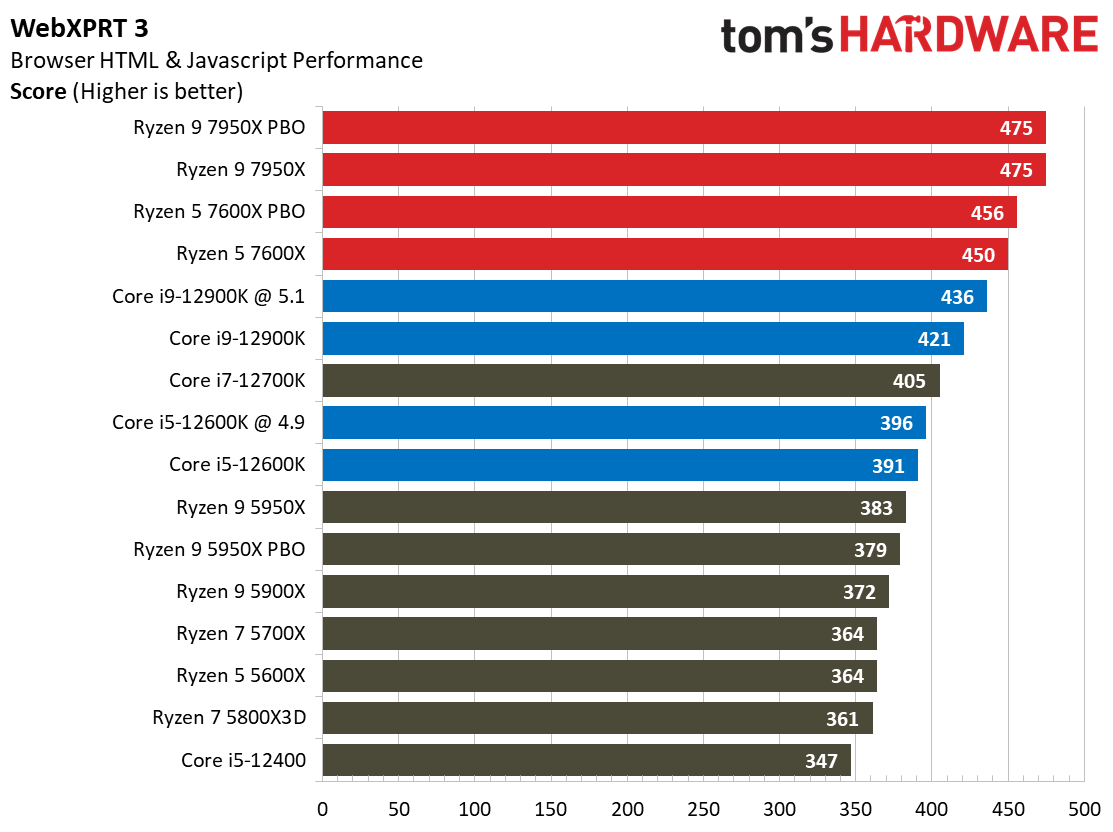
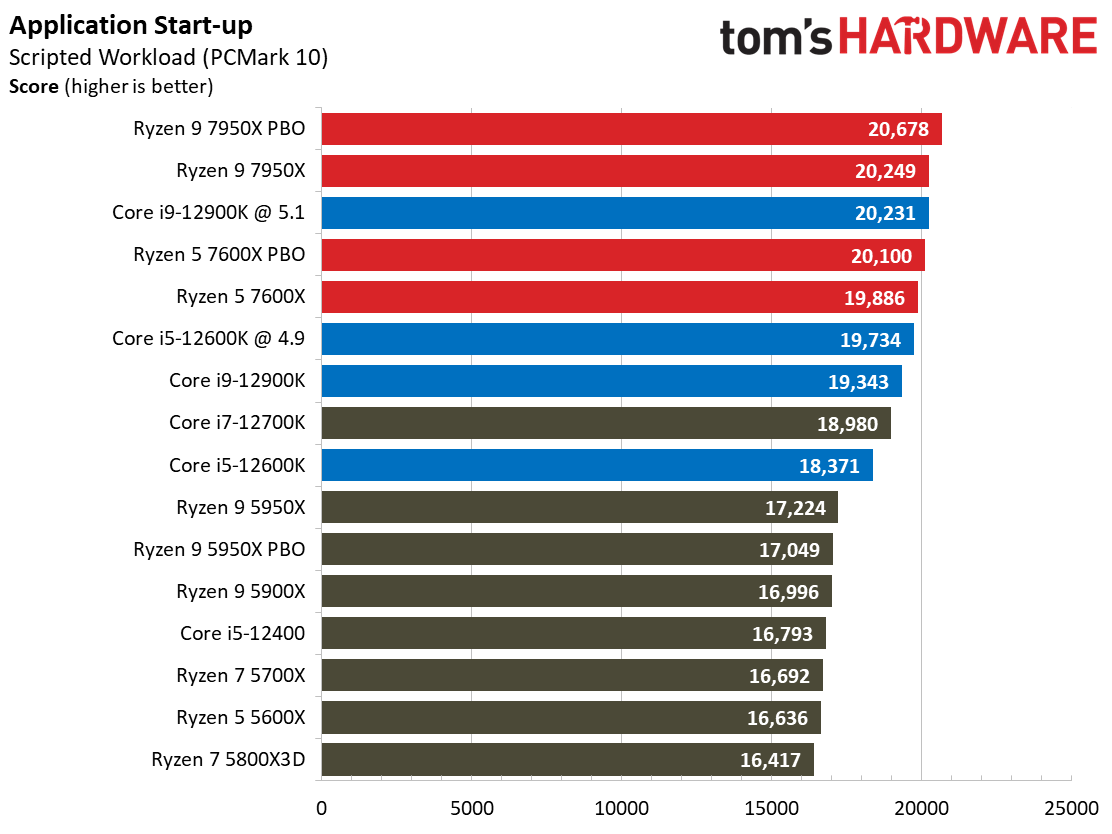
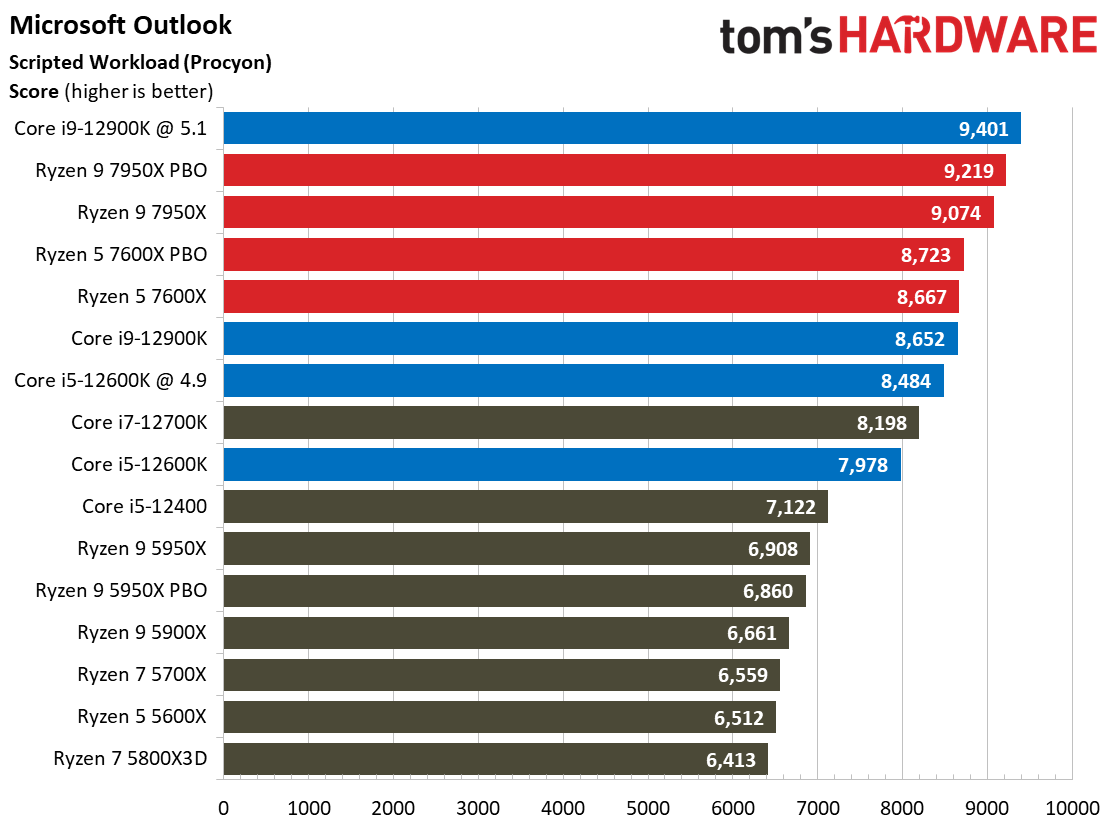
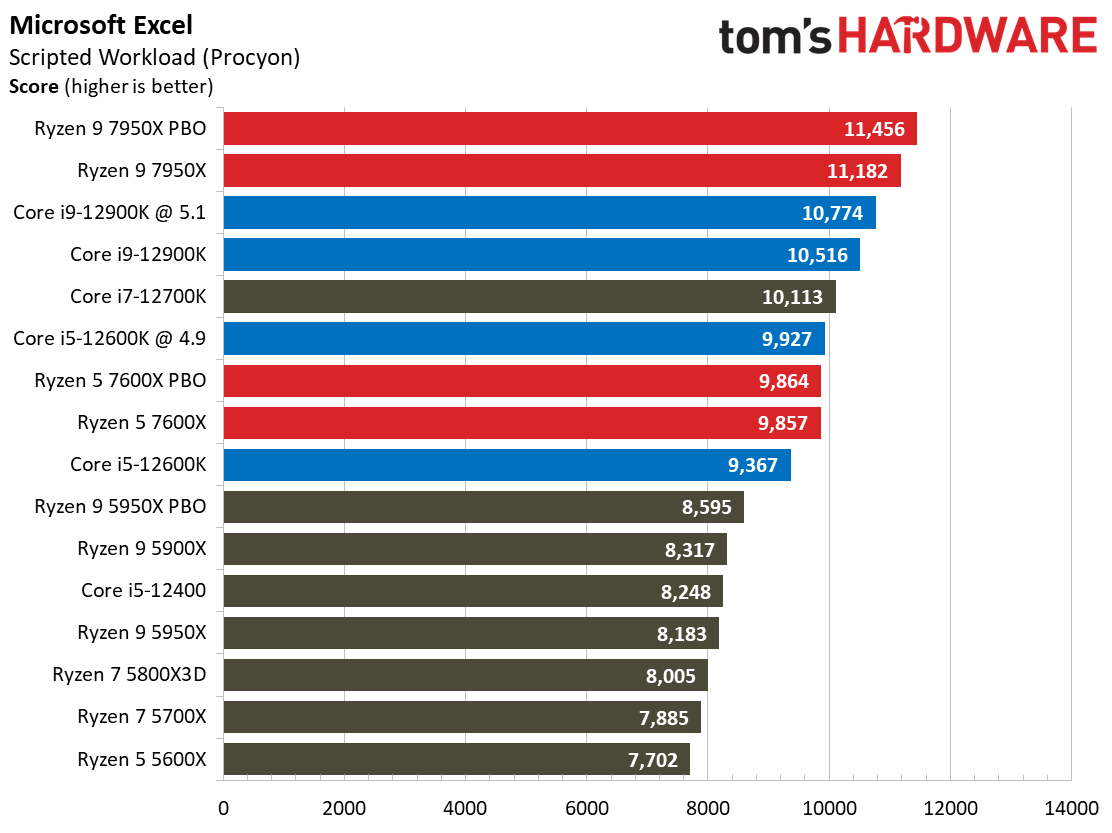
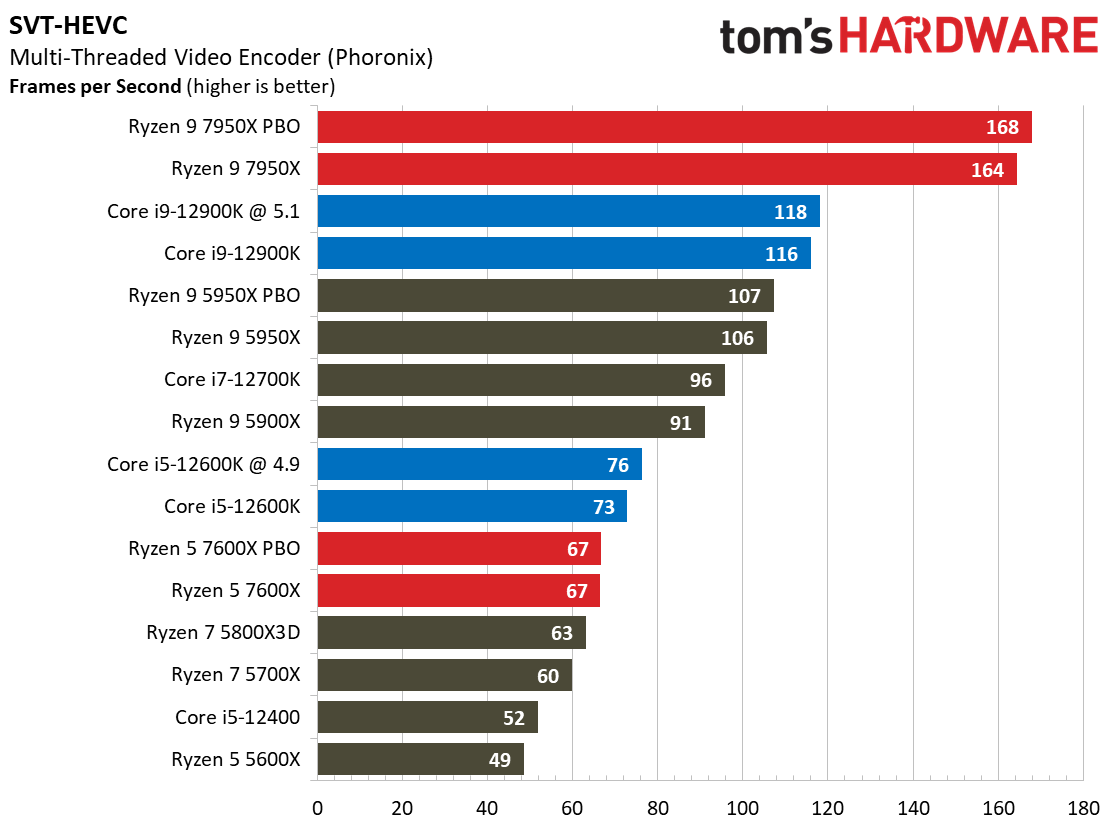
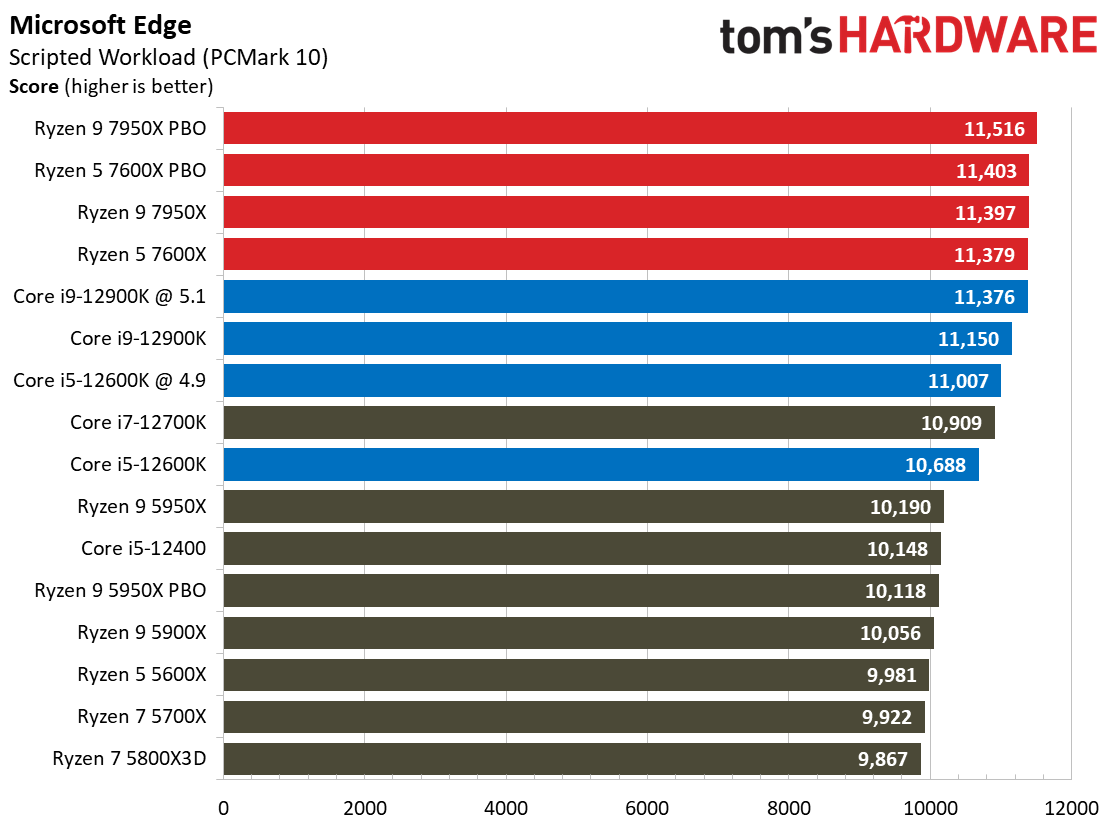
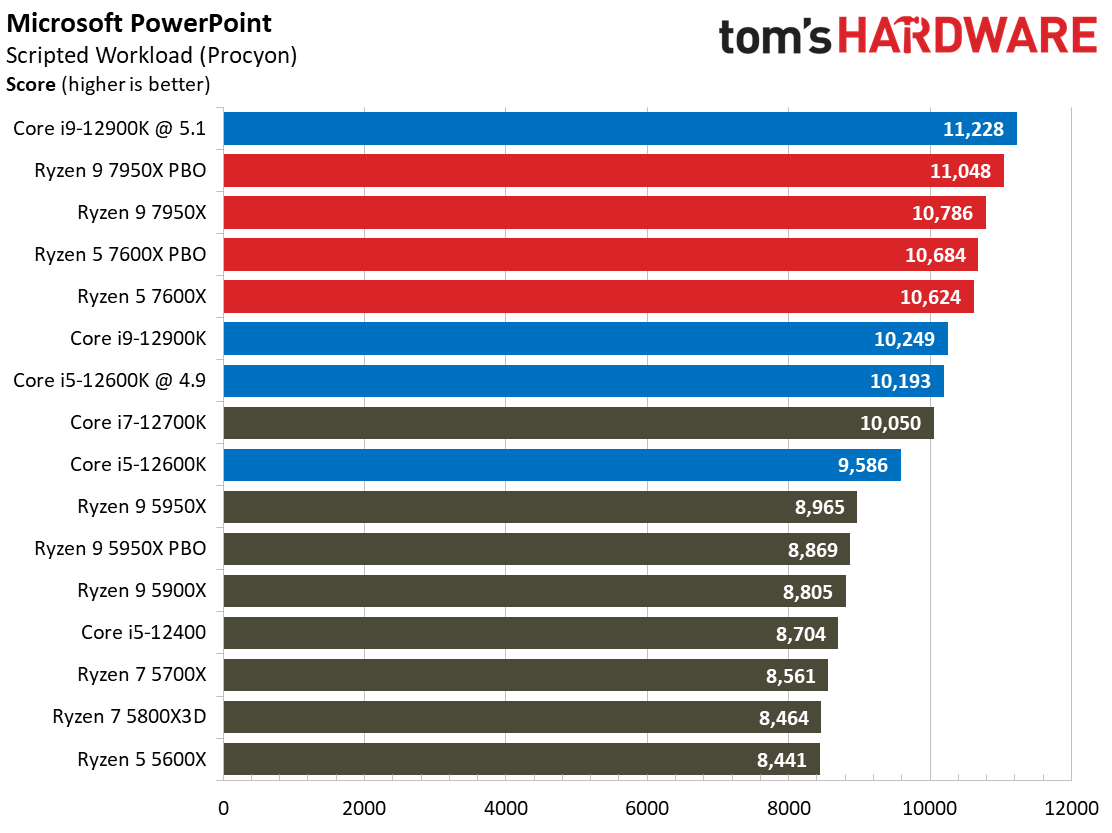
The ubiquitous web browser is one of the most frequently used applications. These latency-sensitive tests tend to be lightly threaded, so a fast response time is critical. Intel typically dominates these benchmarks, but Ryzen 7000 flips the tables and takes the lead in every browser test. The Application Start-up benchmark compares how long it takes to open various applications, thus serving as a great measure of system snappiness. Ryzen 7000 goes a long way to improving AMD’s performance here.
Compilation, Compression, AVX-512 Performance on AMD Ryzen 9 7950X and Ryzen 5 7600X
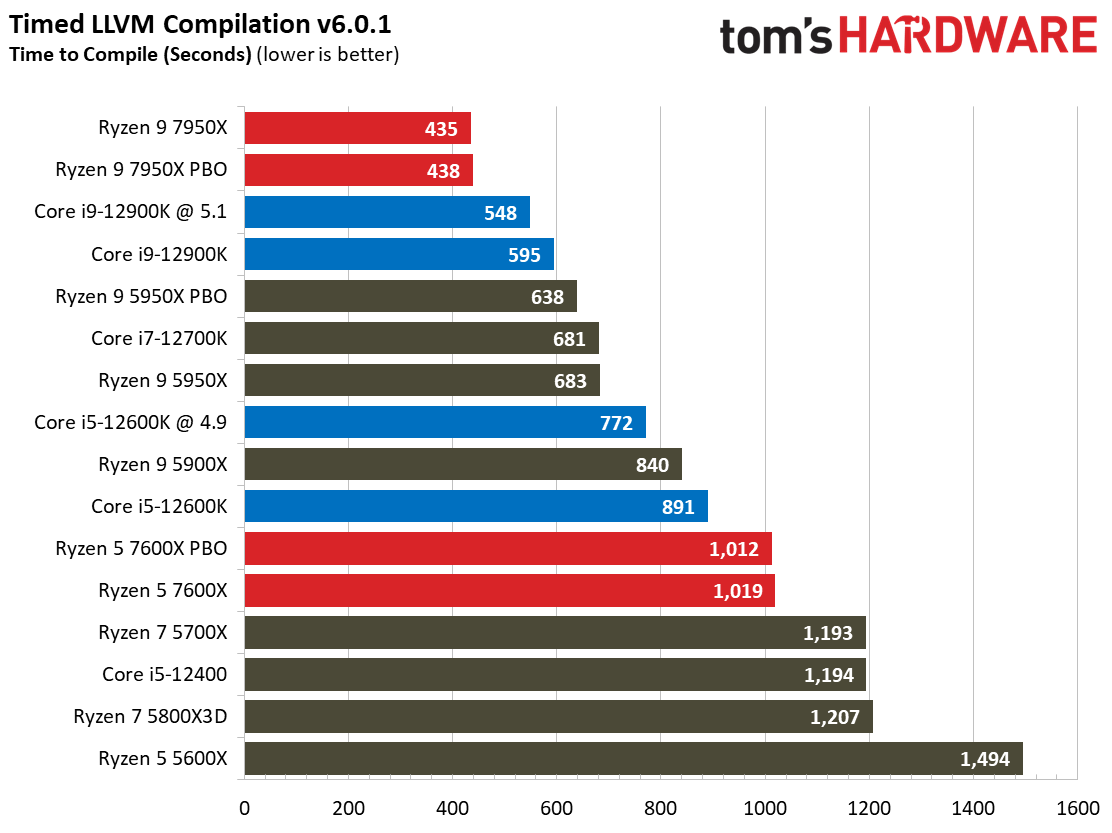
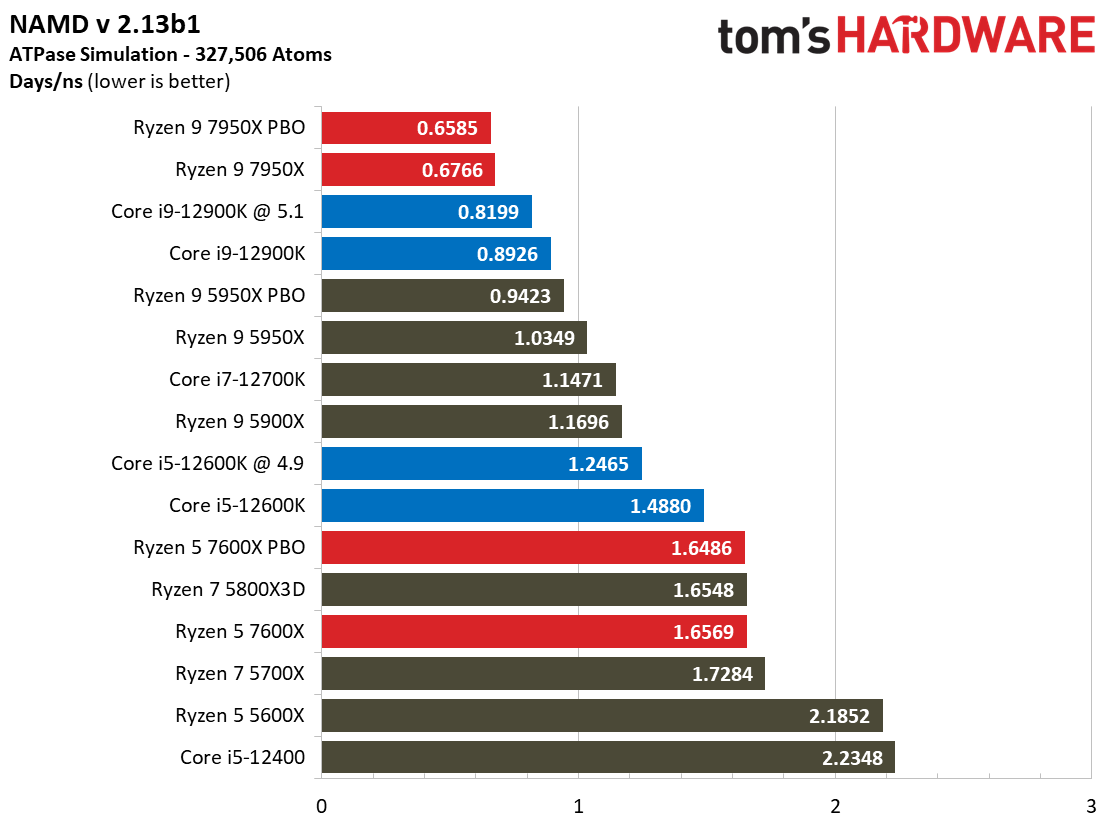
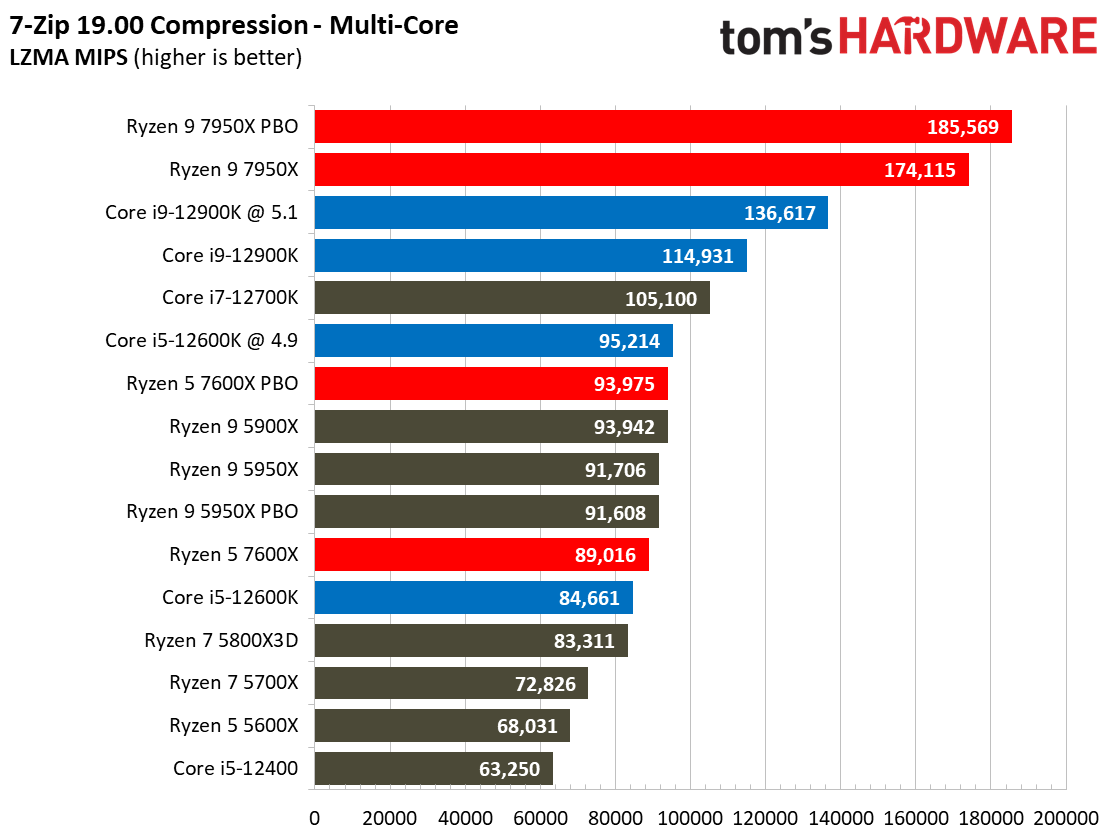
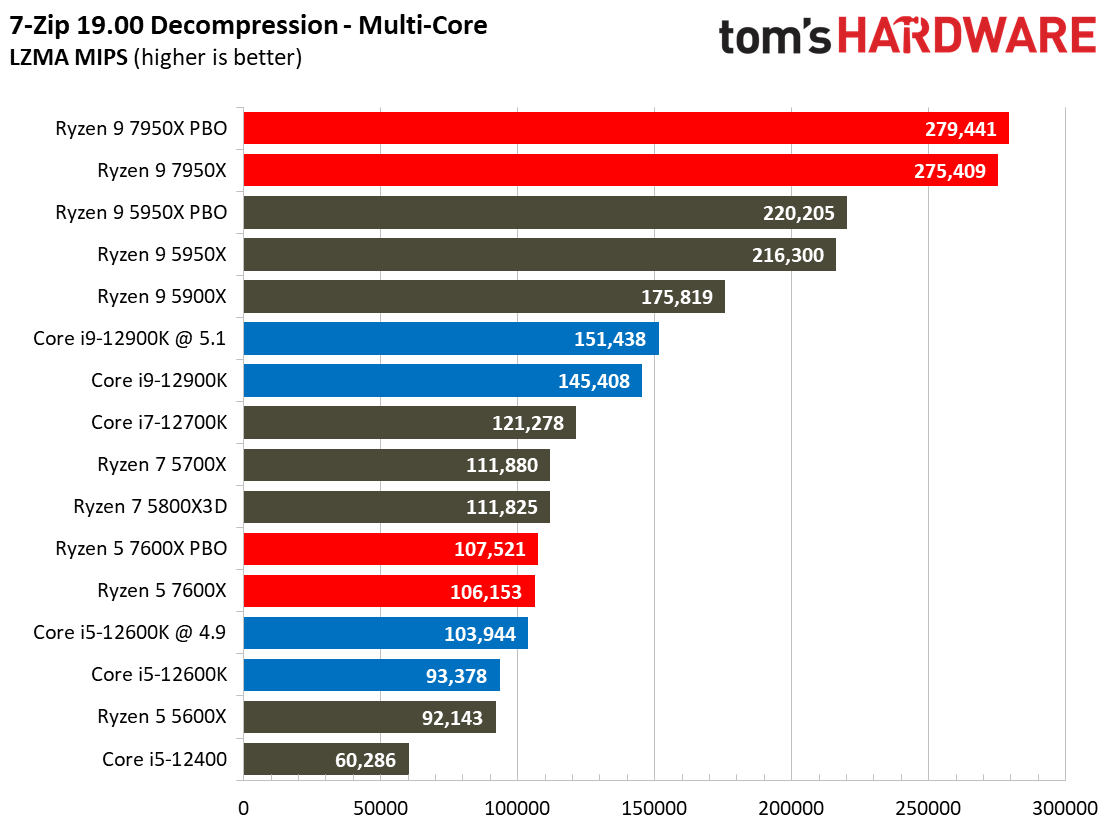
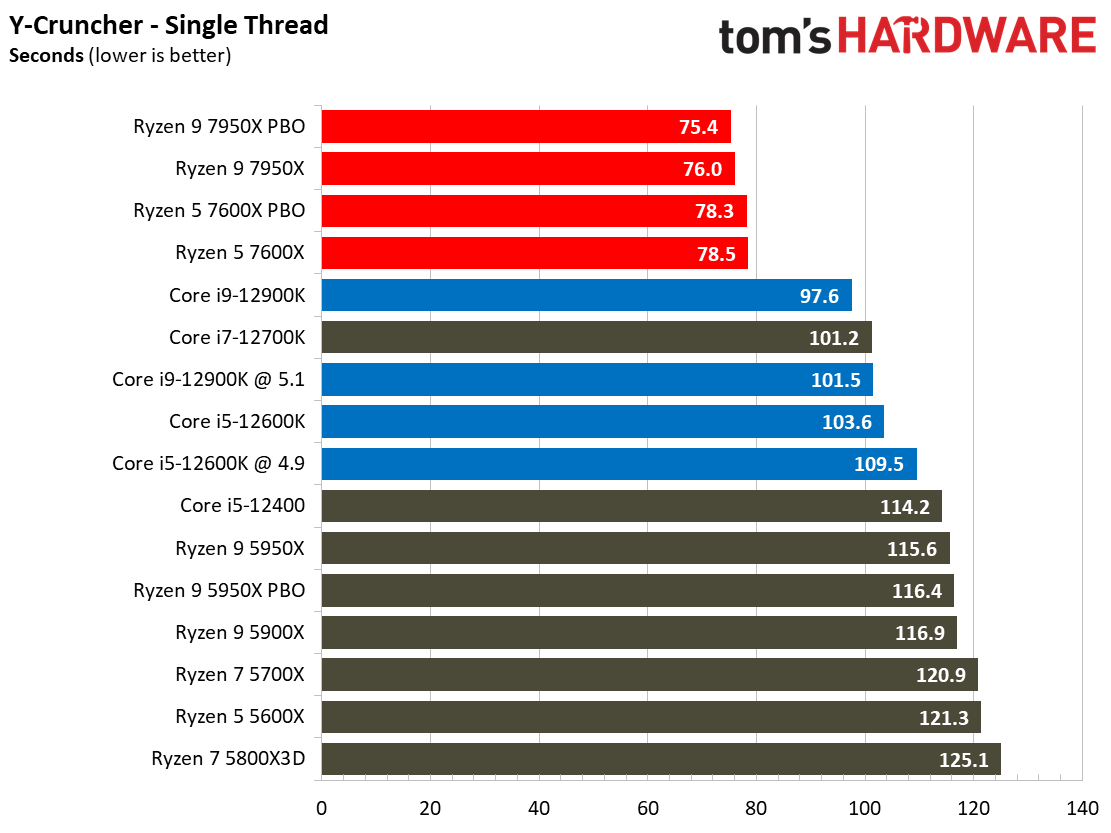
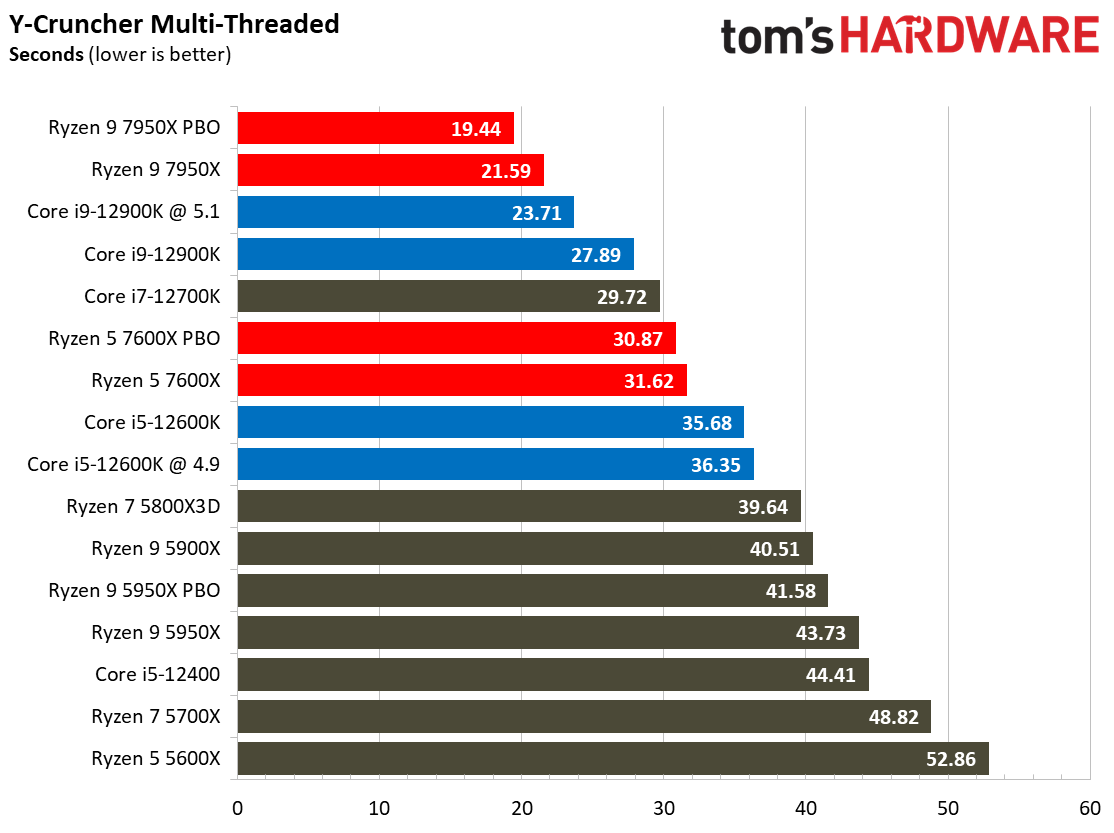
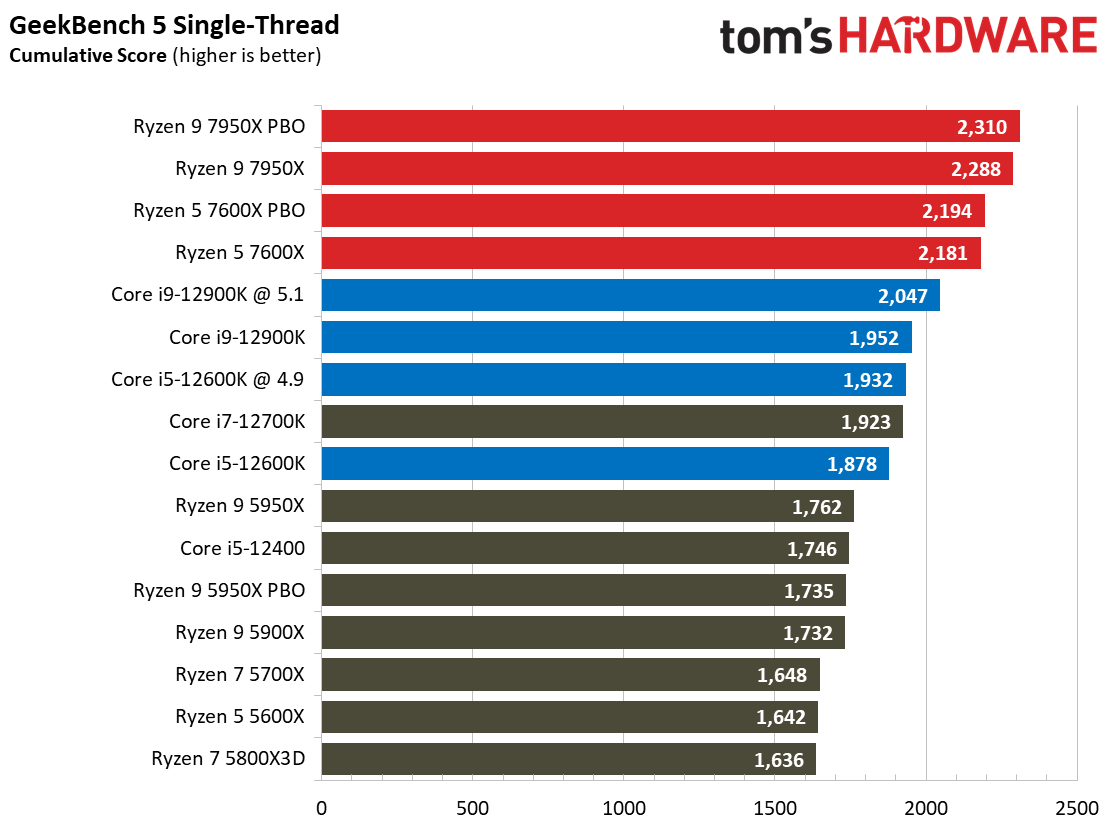
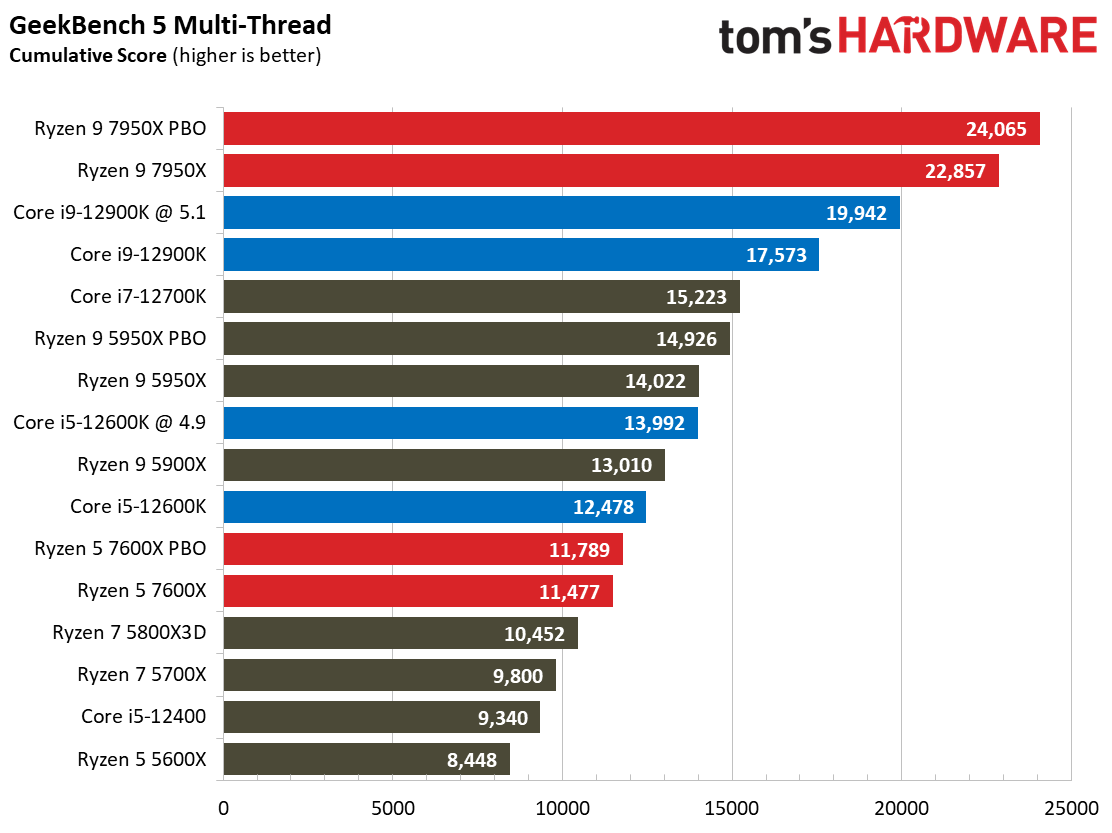
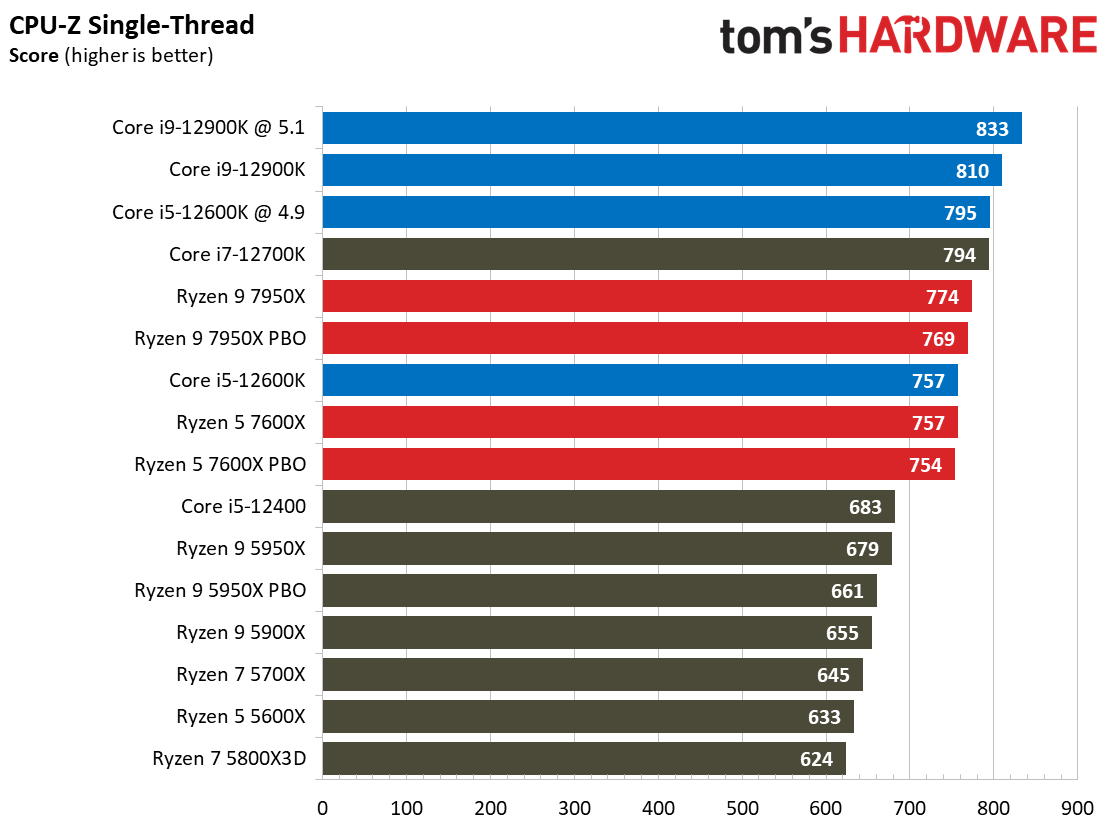
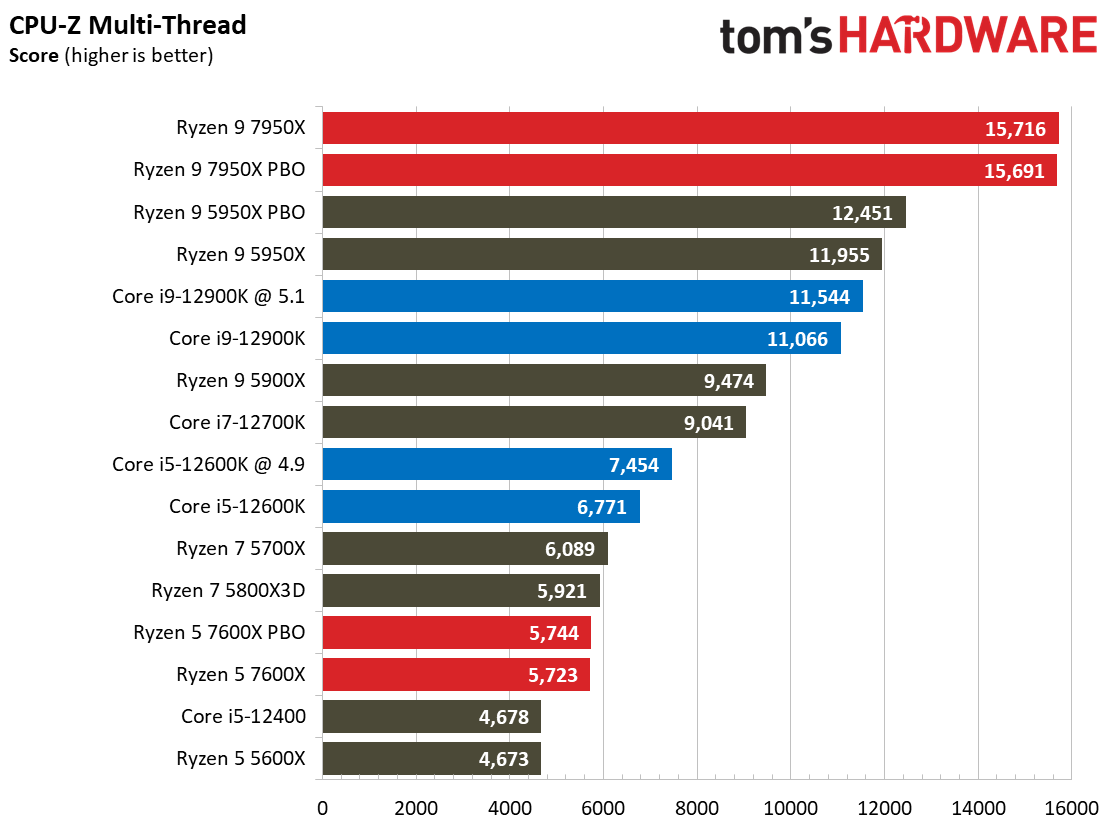
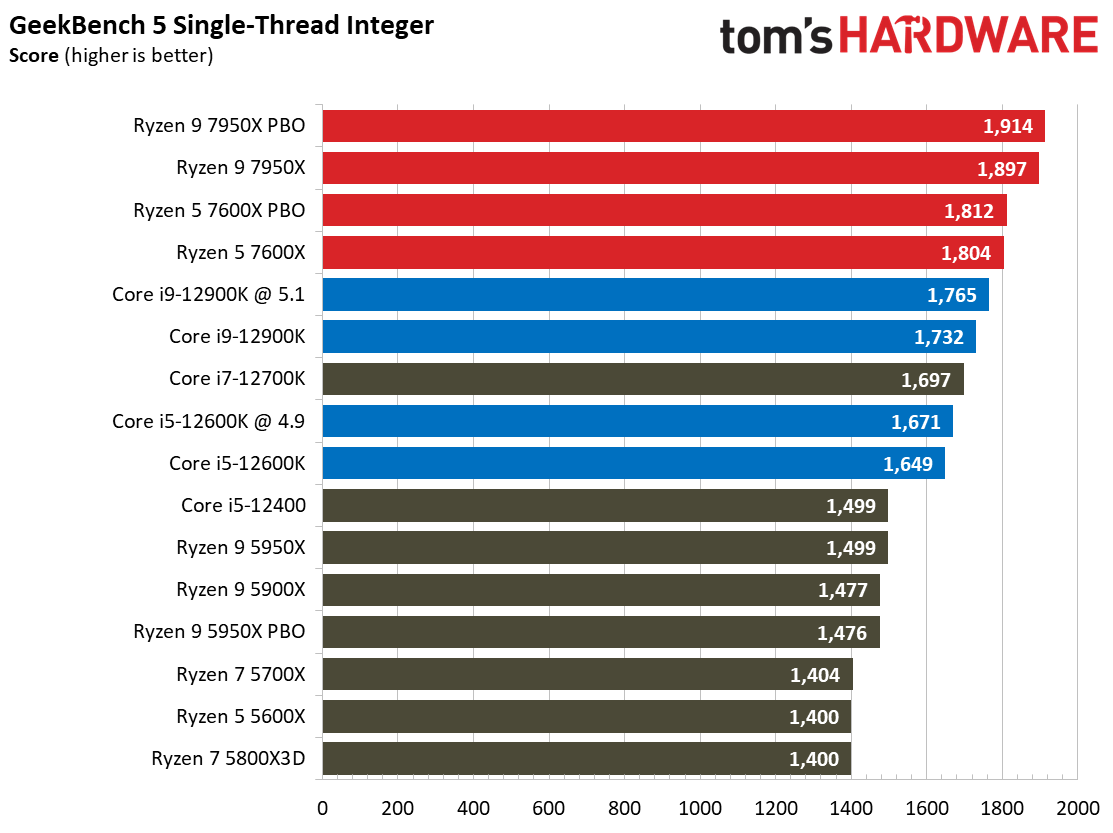
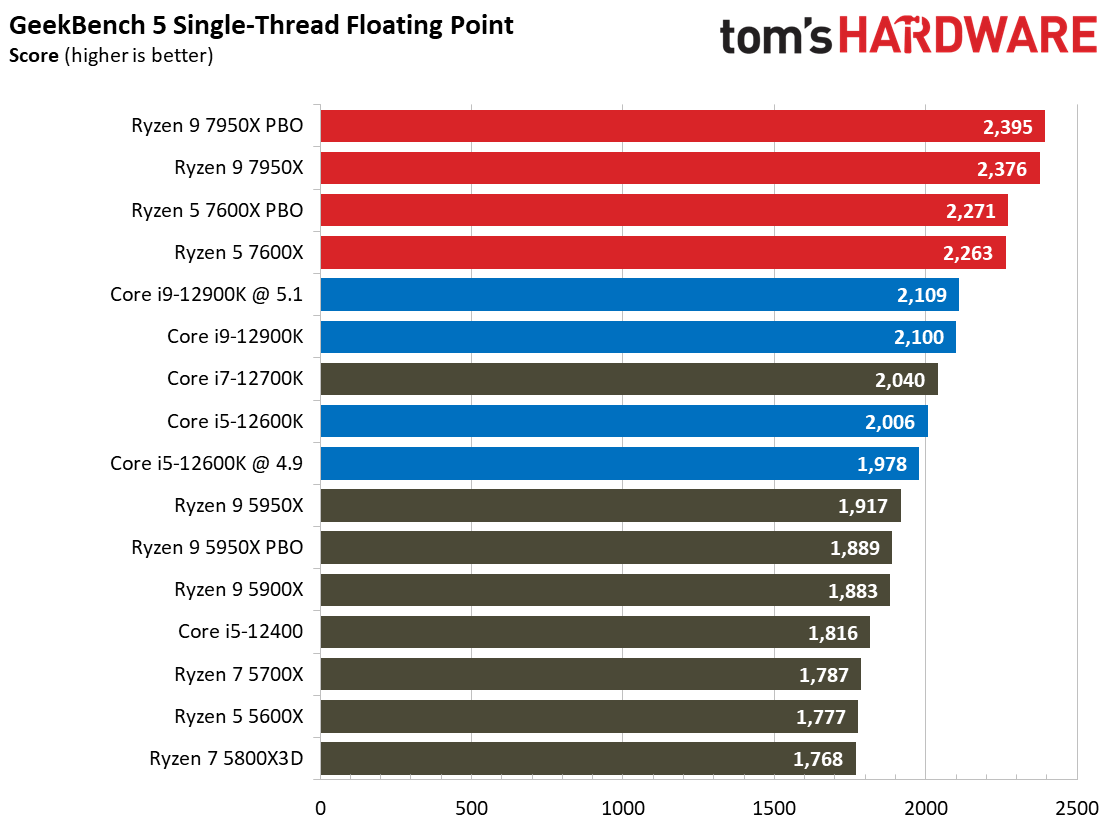
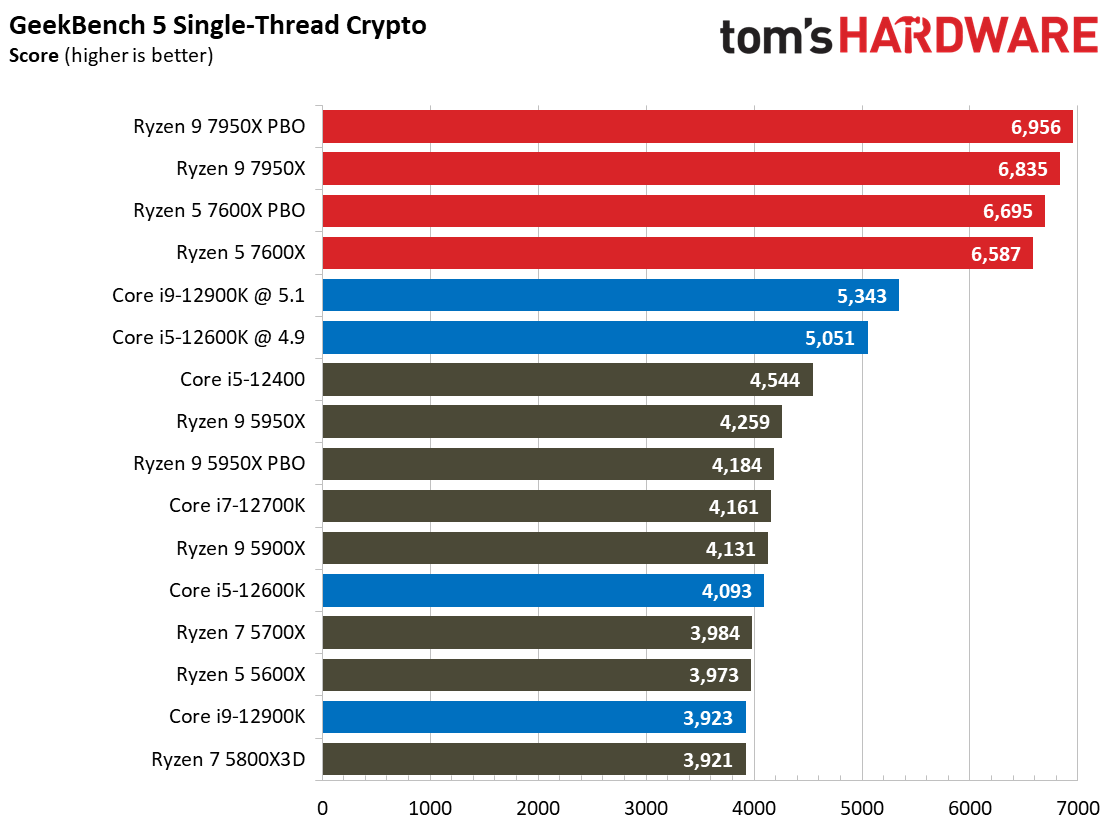
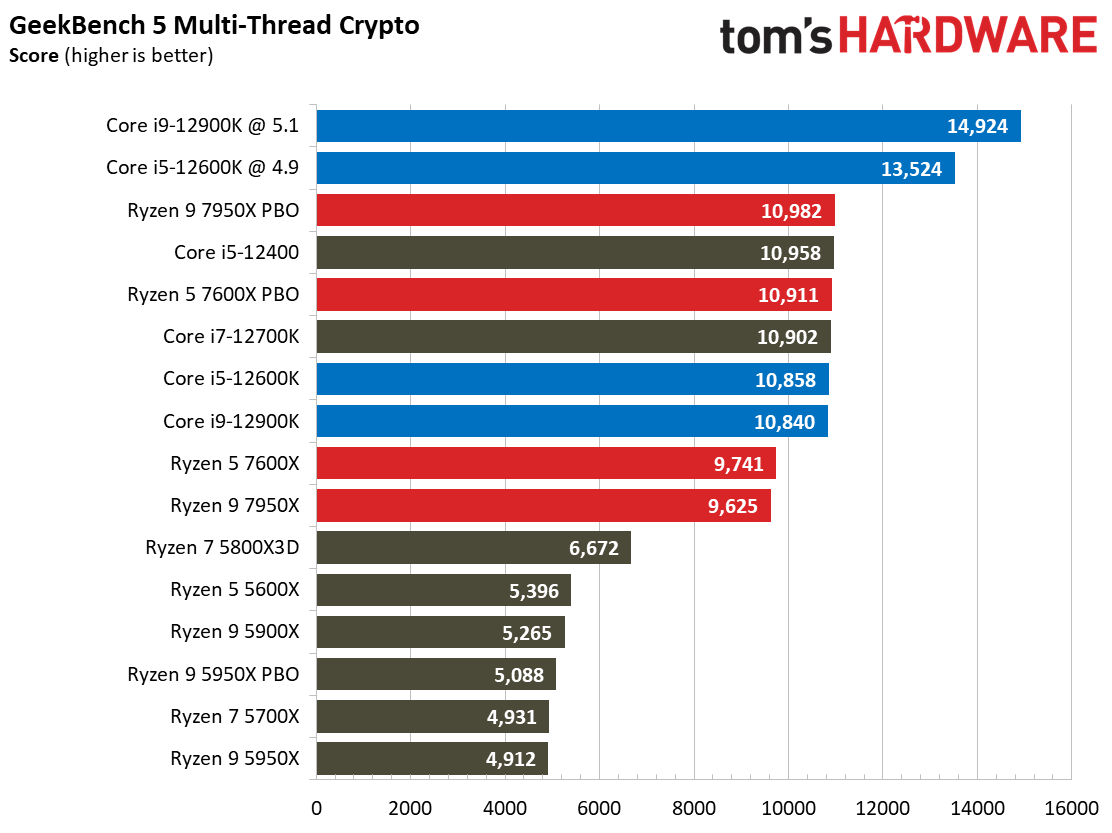
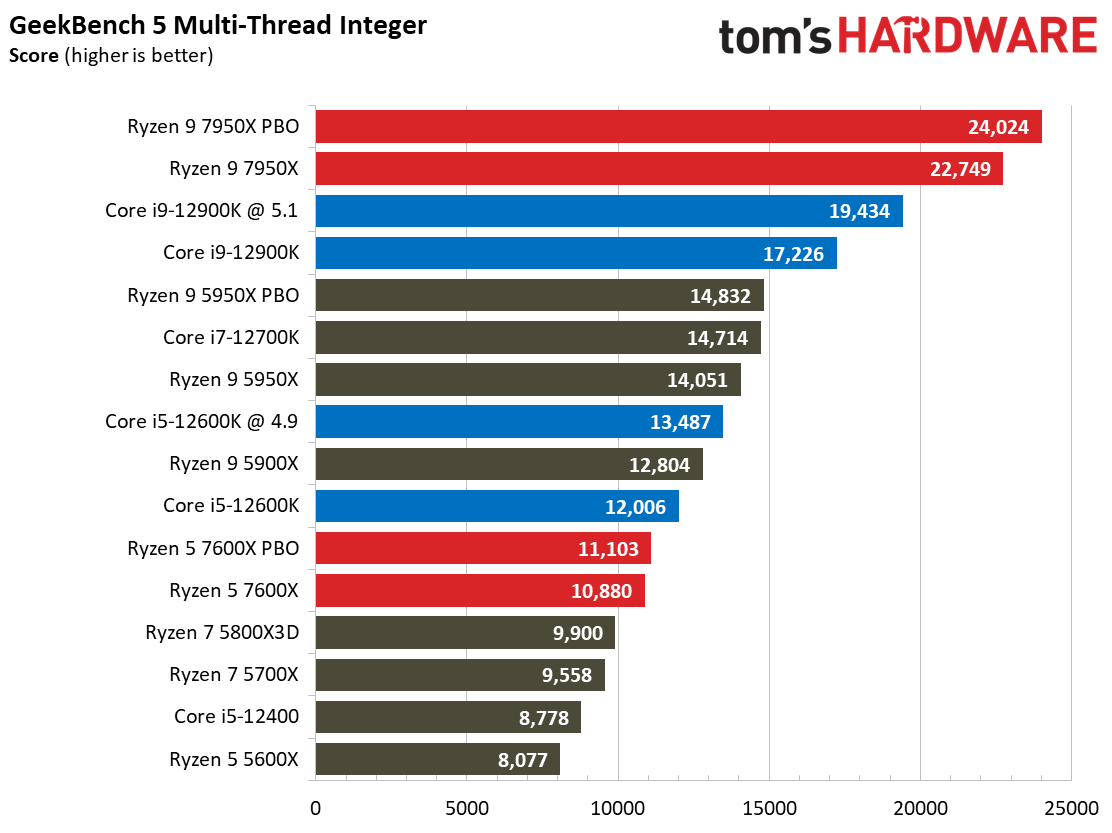
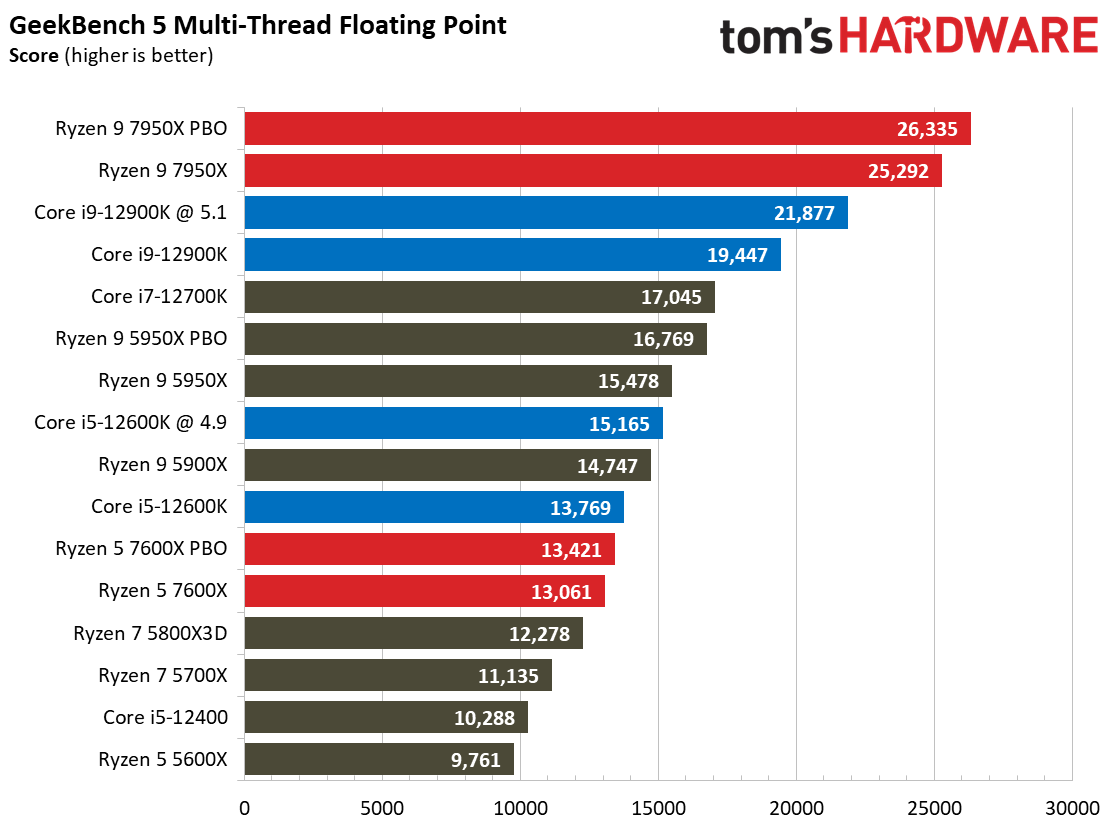
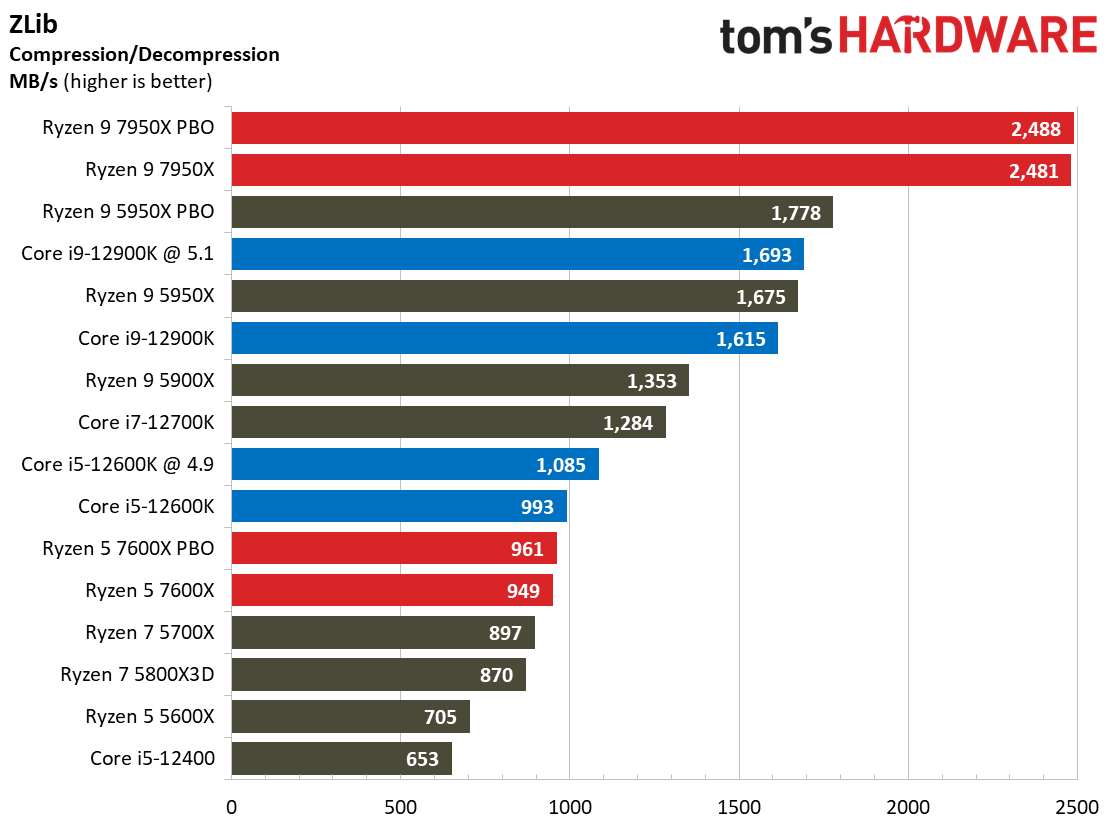
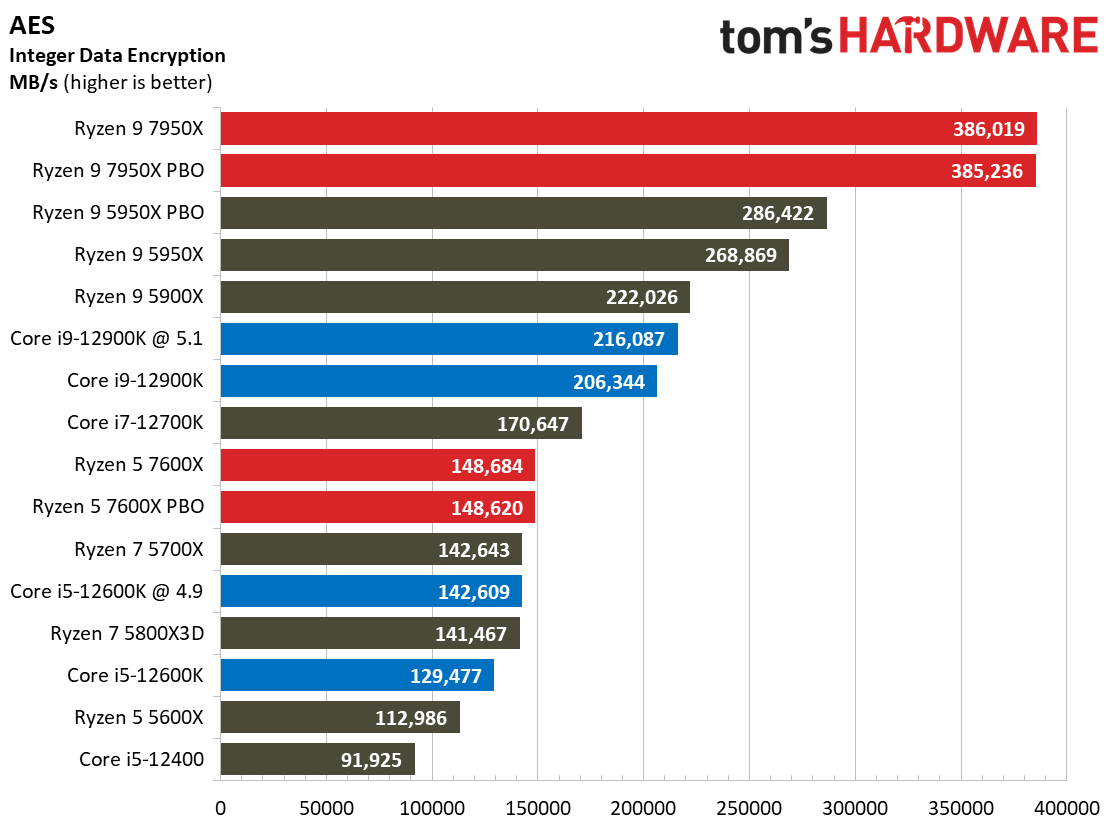
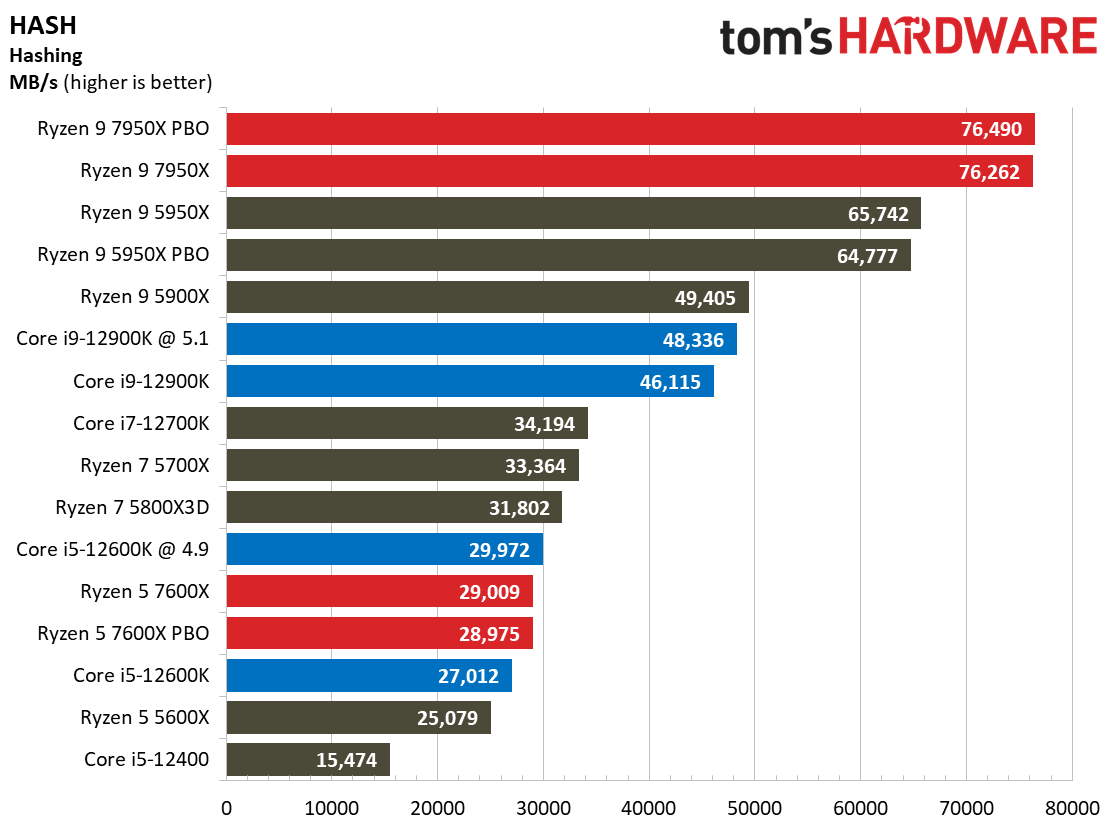
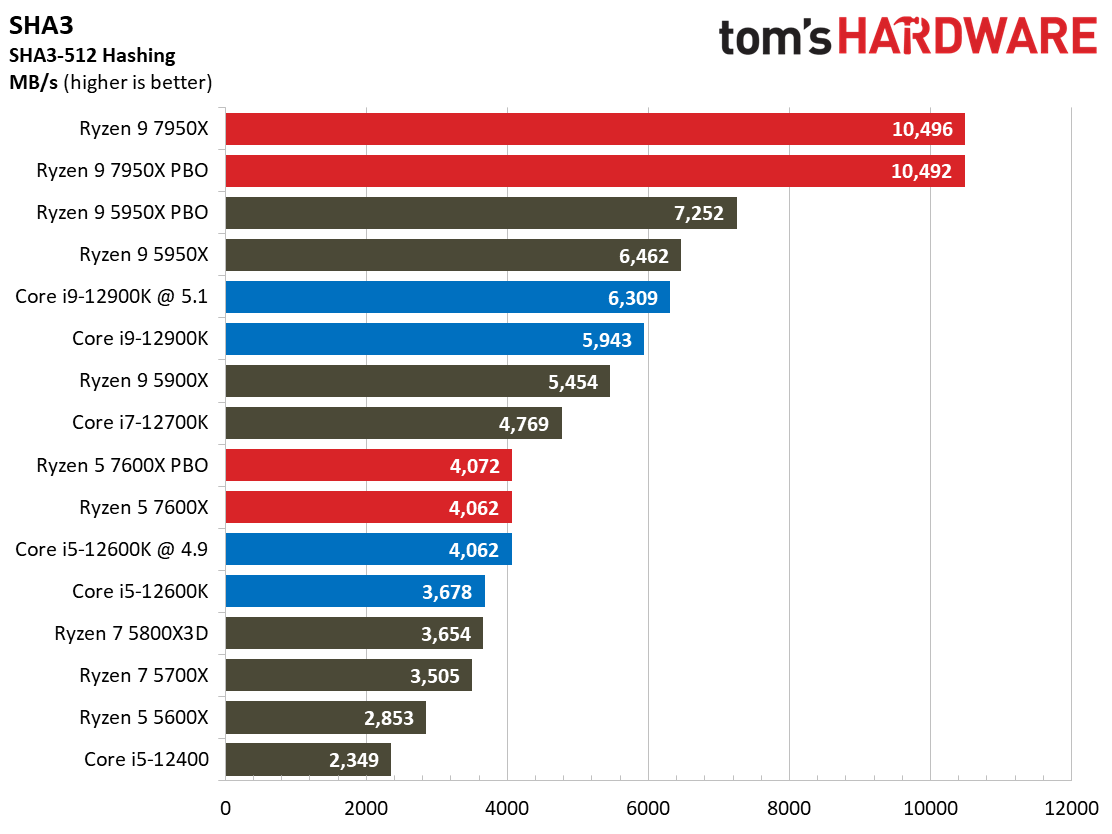
This selection of tests runs the gamut from the exceedingly branchy code in the LLVM compilation workload to the massively parallel molecular dynamics simulation code in NAMD to encryption and compression/decompression performance.
Y-cruncher computes Pi with the AVX instruction set, making for an exceedingly demanding benchmark. We employed the latest version of y-cruncher that has added support for Zen 4, and here we can see the benefits of AVX-512 become apparent in the single-threaded benchmark. Spreading the workload out among the cores in the threaded portion of the y-cruncher test reduces the magnitude of the lead over Intel (per-core memory throughput and/or fabric throughput are likely barriers here), but both Ryzen 7000 chips take a tangible lead over Alder Lake. Even more importantly, we see that this represents a massive generational increase over the Zen 3-equipped Ryzen 5000 chips.
We’re accustomed to Ryzen displaying bipolar performance in compression/decompression workloads, with decompression being a strength while compression suffered compared to other chips. The Zen 4 architecture makes big strides here, delivering incredible performance in both workloads with the Ryzen 9 7950X. Understandably, the gains aren’t as large with the 7600X, but we still see a much more balanced performance profile than we’ve seen with prior-gen Ryzen chips.
The Ryzen 9 7950X takes a pronounced lead over the Core i9-12900K in the NAMD benchmark, but the Ryzen 5 7600X can’t keep pace with the 12600K. We see that same trend play out in the LLVM Compilation benchmark, which bodes well for the 7950X as we head into our suite of professional benchmarks.
- MORE: Best CPUs for Gaming
- MORE: CPU Benchmark Hierarchy
- MORE: AMD vs Intel
- MORE: How to check CPU Temperature
Current page: Desktop PC Application Benchmarks on Ryzen 9 7950X and Ryzen 5 7600X
Prev Page Gaming Benchmarks on Ryzen 9 7950X and Ryzen 5 7600X Next Page Workstation CPU and GPU Benchmarks on Ryzen 9 7950X and Ryzen 5 7600X
Paul Alcorn is the Editor-in-Chief for Tom's Hardware US. He also writes news and reviews on CPUs, storage, and enterprise hardware.
-
-Fran- Thanks for the review(s)!Reply
Good to see more reaffirmation these CPUs don't have a performance problem, but a platform cost (or "cost of entry") problem with them. I hope AMD can alleviate it a bit so they become more of a mainstream crowd fav.
One small point that I won't really defend much, but buying into the AM5 platform, you buy into several years of support. The huge caveat is you have to trust not only AMD, but the partners to go with it and roll the BIOS updates down the line. This being said, after AM4, I'd imagine both AMD and partners have seen it does matter they do keep supporting newer CPUs and see that as a strength. Maybe partners would rather convince you to buy a new motherboard, but allowing this "mix and match" with generations does help overall sales; or so it is my impression. Plus, we all know which motherboard vendors actually followed through with the updates, so they'll get more sales once B650 launches. Could Tom's have the list of motherboards from the 300-series chipsets that do support Ry5K? That would actually help track which partners are indeed reliable and can be trusted with buying into AM5.
Regards. -
Alvar "Miles" Udell The headline: AMD Ryzen 9 7950X and Ryzen 5 7600X Review: A Return to Gaming DominanceReply
The reality: 5800X3D performs better in games than either of those. -
-Fran- Reply
To be pedantic, the title is correct. They now have more than just 1 CPU topping the charts and most (if not all) above Intel offerings.Alvar Miles Udell said:The headline: AMD Ryzen 9 7950X and Ryzen 5 7600X Review: A Return to Gaming Dominance
The reality: 5800X3D performs better in games than either of those.
You'd be correct if the title was something like "7950X is the new gaming overlord/king/champion*" or something that implies "the CPU is 1st in gaming", which as you clearly noticed, it is not.
Plus, it depends on the game anyway.
Regards. -
BogdanH I didn't read the article, simply because it's too long -quick view on some of pages gave me impression, that there's a lot of repeating from previous articles.. so why bother.Reply
Another reason why I didn't read, is the title. When I see a CPU like 7900X/7950X (or Intel's pendant) in conjunction with "gaming", I can already imagine the content. I assume, such title should grab the attention... I'm not sure who's attention, though. Are you trying to convince "gamers" to shell out 800€ for CPU alone? Yes, there's always said, that for gaming alone, it's "wiser" to get 7600X (or 5800X3D) -but such title still imply that 7950X is simply "the right thing"... "if you wish to have it all..". -again, that's my impression, so feel free to diagree.
Ok, so you say (for example), 7950X is 15% faster (in whatever) than 5950X. Now, some of this performance increase happens thanks to faster new DDR5 memory. And quite a lot performance increase (in my opinion) goes to much higher clock speed -which in turn comes back as heat dissipation. There's also faster PCIe5.0, etc ... Now I wonder, how much has actual CPU improved (compared to 5950X)? I mean IPC. Because if IPC is the same, then I see 7950X as a "brute force" improvement. In sense: Make it faster, no matter the costs (power draw & heat dissipation).
Yes, I know: 7950X finishes work faster (than 5950X) and so at the end, electricity bill will be lower. That's true if we look strictly from CPU side. But, if we take the cooling (of whole PC) into account, then the total power draw doesn't look that appealing anymore -especially in summer. In short: CPU is more efficient, but whole PC probably isn't.
I can read many times in forums, that many are already running their PC in eco-mode (to save energy, to make PC more silent, having less heat in room, etc) -they're ready to sacrifice fps by few percent for that. So I assume, what they wish or hope for, is certain performance increase, without affecting power draw -at least not by much.
I don't blame AMD/Intel/Nvidia for going into high power consumption direction. They know we wish everything faster (than it was in previous generation), so they do it -and many will buy it.. and that's the whole idea,
However, I do blame media for not putting more investigation/research into efficiency and write about that.
Just sharing my thoughts (being aware I may be wrong)
Bogdan -
DavidLejdar Reply-Fran- said:Thanks for the review(s)!
Good to see more reaffirmation these CPUs don't have a performance problem, but a platform cost (or "cost of entry") problem with them. I hope AMD can alleviate it a bit so they become more of a mainstream crowd fav.
...
If one wants to go for as cheap a build as possible e.g. just to play CS:GO, then yeah, the DDR5 requirement with AM5 may sure be off-putting. Myself, I will be upgrading in the near future from DDR3 anyhow, and (here) the extra cost for 32 GB DDR5-5200 (instead of DDR4-3200) is around 80 currently. At the same time, B650E has PCIe 5.0 both for GPU (16x) and NVMe at currently around 300-400 cheaper than what motherboards for Raptor Lake with the same connectivity cost (that is the few released so far). And only a handful of Alder Lake MBs have PCIe 5.0 for NVMe, while taking away 8 lanes from the GPU for that though.
So what I am currently looking at is around 250 for AM5 motherboard and 170 for 32 GB of DDR5 - which isn't as cheap as it can get, but should be plenty good for at least several years, giving me the option to upgrade individual parts later.
And to me that seems worth it to go for that, instead of saving perhaps 100 bucks with a Raptor Lake MB and DDR4 now, which likely won't support Meteor Lake already and would require me to get a lot of new parts then if I may want to boost performance in a year or two.
Of course, as you point out, not really a guarantee that even AMD directly may not push AM6 soon if Meteor Lake is taking it all to very new heights. But even if I upgrade the MB sooner than I was expecting, at least I will already have DDR5 to reuse, including having made use of it in the meantime.
BogdanH said:... . But, if we take the cooling (of whole PC) into account, then the total power draw doesn't look that appealing anymore -especially in summer. In short: CPU is more efficient, but whole PC probably isn't.
I can read many times in forums, that many are already running their PC in eco-mode (to save energy, to make PC more silent, having less heat in room, etc) -they're ready to sacrifice fps by few percent for that. So I assume, what they wish or hope for, is certain performance increase, without affecting power draw -at least not by much. ...
Very strictly taken, sure, the cooling uses some power too. But then again, a case fan has a power consumption of up to 6W, and CPU coolers (air or liquid) usually don't consume more than that. So even if all the cooling would take 20W at full load, that is 50 hours of full load to get to 1 kWh. And e.g. in the U.S., it is less than $1 for 4 kWh, isn't it?
The electricity costs can add up quickly though. E.g. if someone is gaming 50 hours a week at 700W, that's possibly up to 35 kWh right there, coming to 140 kWh a month.
Myself, I wouldn't know how to have that much time for gaming. So even if my rig would consume 700W, perhaps every other week to play at full load for a total of 10 hours, at the U.S. electricity price that would be less than $2.
Which isn't to say that it wouldn't be nice if there would be more improvement for power efficiency. But the review mentions that the Ryzen 5 7600X is a very sound choice for gaming (unless one can wait a few months to check out the gaming specific CPU). And that one has quite less Watt than the top tier one. And coupled with perhaps not the top-tier GPU around, e.g. the RTX 3060, which has around 200W, one can have a solid build which comes in at under 500W at full load. -
BogdanH Reply
-that's 20W (probably less) just to move hot air out of PC case into our room.. which we need to cool in summer days.DavidLejdar said:Very strictly taken, sure, the cooling uses some power too. But then again, a case fan has a power consumption of up to 6W, and CPU coolers (air or liquid) usually don't consume more than that. So even if all the cooling would take 20W at full load...
Many say, it's "only 10€/year more" (or whatever number).. but there are millions of PC's running. And if looking that way, we can see see how much energy is wasted.. and is really not about who can afford to pay electricity and who can't.
Best wishes,
Bogdan -
chalabam Der Bauer has shown that this CPU is 20 degrees hotter than it should be due to bad packagingReply -
Sluggotg Nice new lineup for AMD. Looking forward to the industry moving to PCIE 5 and USB 4. The 7600 is very impressive. (For 300 Bucks!). With Intel's new chips coming out next month we should see some very healthy competition that will hopefully lead to overall lower prices. With the New CPUs and the New Graphics cards all coming out in the next several months, we should be able to do some nice upgrades. Hopefully the Scalpers will fail to corner the market.Reply -
-Fran- Reply
Er... Paul (the article) did include IPC measurements and a couple parragraphs to that. Zen4 is indeed faster, clock for clock, than Zen3. It's just it gets more overall performance from the increased clocks (hence the higher power budget) than raw IPC improvements.BogdanH said:I didn't read the article, simply because it's too long -quick view on some of pages gave me impression, that there's a lot of repeating from previous articles.. so why bother.
Another reason why I didn't read, is the title. When I see a CPU like 7900X/7950X (or Intel's pendant) in conjunction with "gaming", I can already imagine the content. I assume, such title should grab the attention... I'm not sure who's attention, though. Are you trying to convince "gamers" to shell out 800€ for CPU alone? Yes, there's always said, that for gaming alone, it's "wiser" to get 7600X (or 5800X3D) -but such title still imply that 7950X is simply "the right thing"... "if you wish to have it all..". -again, that's my impression, so feel free to diagree.
Ok, so you say (for example), 7950X is 15% faster (in whatever) than 5950X. Now, some of this performance increase happens thanks to faster new DDR5 memory. And quite a lot performance increase (in my opinion) goes to much higher clock speed -which in turn comes back as heat dissipation. There's also faster PCIe5.0, etc ... Now I wonder, how much has actual CPU improved (compared to 5950X)? I mean IPC. Because if IPC is the same, then I see 7950X as a "brute force" improvement. In sense: Make it faster, no matter the costs (power draw & heat dissipation).
Yes, I know: 7950X finishes work faster (than 5950X) and so at the end, electricity bill will be lower. That's true if we look strictly from CPU side. But, if we take the cooling (of whole PC) into account, then the total power draw doesn't look that appealing anymore -especially in summer. In short: CPU is more efficient, but whole PC probably isn't.
I can read many times in forums, that many are already running their PC in eco-mode (to save energy, to make PC more silent, having less heat in room, etc) -they're ready to sacrifice fps by few percent for that. So I assume, what they wish or hope for, is certain performance increase, without affecting power draw -at least not by much.
I don't blame AMD/Intel/Nvidia for going into high power consumption direction. They know we wish everything faster (than it was in previous generation), so they do it -and many will buy it.. and that's the whole idea,
However, I do blame media for not putting more investigation/research into efficiency and write about that.
Just sharing my thoughts (being aware I may be wrong)
Bogdan
Regards. -
hotaru251 so zen 3 they held out entire generation for a 5700xReply
and now zen 4 its the 7800x missing...AMD ffs why do you do this?
and as said before...the cpu are great, but platform isnt worth it with 5800x3d existing.
(will likely change by time weg et 3d cache zen4 cpus)